#in Judaism the past never ends
Explore tagged Tumblr posts
Text

#primo levi#poetry#jumblr#jewish things#for those of you who don’t know Primo Levi was a writer and a Holocaust Survivor#February 1944 is when his camp got deported to Auschwitz#and of course today is Sunday February 25#(it is also my birthday)#(I was also born on a Sunday)#in Judaism the past never ends#Baruch Dayan Ha’Emet
22 notes
·
View notes
Text
I do realize this is a real niche post but I cannot tell you how many damn times over the past 10 months I've seen gentiles tell Jews some version of, "Your own holy book SAYS God doesn't want you to have a country yet!"
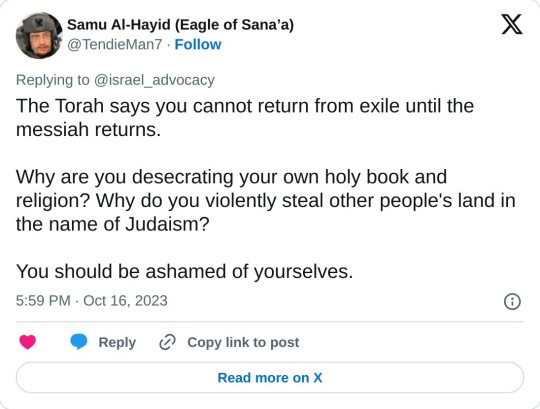
And it's such an incredibly blatant and weirdly specific tell that they're not part of something that grew from progressive grassroots, but something based on right-wing astroturfing.
1. Staying in your own lane is a pretty huge progressive principle.
Telling people in another group that their deity said they couldn't do X is, I think, as far as you can get from your own lane.
2. It's also very clearly Not In Your Own Lane because I've never seen anyone actually be able to EITHER quote the passage they're thinking of, OR cite where it is.
It's purely, "I saw somebody else say this, and it seemed like it would make me win the debate I wasn't invited to."
3. It betrays a complete ignorance of Jewish culture and history.
Seriously? You don't know what you're referencing, its context, or even what it specifically says, but you're... coming to a community that reads and often discusses the entire Torah together each year, at weekly services... who have massive books holding generations of debate about it that it takes 7 years to read, at one page per day....
And saying, "YOUR book told you not to!"
I've been to services where we discussed just one word from the reading the whole time. The etymology. The connotations. The use of it in this passage versus in other passages.
And then there is the famous saying, "Ask two Jews, get three opinions." There is a culture of questioning and discussion and debate throughout Judaism.
You think maybe, in the decades and decades of public discussion about whether to buy land in Eretz Yisrael and move back there; whether it should keep being an individual thing, or keep shifting to intentional community projects; what the risks were; whether it should really be in Argentina or Canada or someplace instead; how this would be received by the Jews and gentiles already there, how to respect their boundaries, how to work with them before and during; and whether ending up with a fuckton of Jews in one place might not be exactly as dangerous for them as it had always been everywhere else....
You think NOBODY brought up anything scriptural? Nobody looked through the Torah, the Nevi'im, the Ketuvim, or the Talmud for any thoughts about any of this?? It took 200 years and some rando in the comments to blow everyone's minds???
4. It relies on an unspoken assumption that people can and should take very literal readings of religious texts and use them to control others.
And a sense of ownership and power over those texts, even without any accompanying knowledge about what they say.
It's kind of a supercessionist know-it-all vibe. It reads like, "I know what you should be doing. Because even if I'm not personally part of a fundamentalist branch of a related religion, the culture I'm rooted in is."
Bonus version I found when I was looking for an example. NOBODY should do this:

There are a lot of people who pull weird historical claims like "It SAYS Abraham came from Chaldea! That's Iraq!"
Like, first of all, a group is indigenous to a land if it arose as a people and culture there, before (not because of) colonization.
People aren't spontaneously spawning in groups, like "Boom! A new indigenous people just spawned!!"
People come from places. They go places. Sometimes, they gel as a new community and culture. Sometimes, they bop around for a while and eventually assimilate into another group.
Second: THE TORAH IS NOT A HISTORY TEXTBOOK OMFG.
It's an oral history, largely written centuries after the fact.
There is a TON of historical and archaeological research on when and where the Jewish culture originated, how it developed over time, etc. It's extremely well-established.
Nobody has to try to pull what they remember from Sunday school for this argument.
#jumblr#Jewish history#hamas propaganda and fundie Christian propaganda are a terrible mix#fuck hamas#depressing discourse#wall of words
611 notes
·
View notes
Note
hi ! i hope you're doing well, and i just wanna say first that i love your blog and it just radiates comforting vibes :)
i wanted to ask for some advice. i chose god over a year ago after having this push-pull thing with him for almost ten before that. most of my issues with actually accepting him came from ideas i had about him from his more conservative/evangelical followers, which i began to debunk for myself after figuring out that god, not them, was who i wanted.
so i've been sticking to the old testament, mostly. i found god in there, grew to love him because of it, and it's just a beautiful text, but also there are far fewer conservative dogwhistles in there than there are in the new testament. the new testament is hard for me to look at, and i feel guilty about it.
and its like- ive grown up with jesus my whole life. my parents are methodist, i was raised methodist. but i've never felt very close to him, thanks to those who twisted his verses about love and kindness into weapons against people like me. i read these verses that mean so much (john 3:16 and the like) and all i get out of it is a crawling sense of dread. like the associations are Bad, and it seeps through the whole new testament.
all this long-winded nonsense is basically to say that somebody got their hands all over the new testament and now i look at it and it is just barren. have you ever experienced something like this? any advice on how to,, reclaim the new testament or something? (thank you so much for reading this holy shit it's long. sorry about that)
Thank you beloved, I'm glad you're here! No such thing as too long here, I promise—well, there might be on my end. (You've been warned.) I'm overjoyed that you've chosen to pursue God—separating what you've been told from what you seek to believe in is such a hard thing to navigate.
I'm gonna be honest, this is such a refreshing question and I'm glad that you're asking it. I overwhelmingly hear the opposite from Christians—that the New Testament is easy and loving and comforting, and the Old Testament is scary and violent or whatever. I always want to ask first, what their opinions of Judaism are, because that's a red flag to me; and next, have they read the NT? It isn't easy and it isn't always comforting, and I think too many Christians only read the parts that they think are. The fact that you're recognizing those hard things and wanting to deal with them is a beautiful thing—we should take these texts seriously enough to criticize and struggle with them.
First of all: You have no need to feel guilty for what other people have done with holy things, or for your emotions. You have not done something wrong by carrying this hurt with you. What we feel is not in our control—but we can listen to it. Let this be a movement of desire, not of guilt. You're seeking God past the dread. You want to grow enough that the ideas people have taught you don't stand between you and what you want—and you've already done so much of this growth. I believe that you can keep moving in the direction of God, and find God in more and more places. But you don't have to pretend it's not hard. And if it was easy I'm not sure that would be a good thing.
Your experiences and associations and discomfort and fear—they're your history and they're also the history of the text. I'm sure you've heard people say "Don't let stuff like that turn you away from the original meaning of the verses!" Or "Jesus didn't mean that!" But of course the verses hold weight. They've had baggage before they ever got to you—two thousand years of it. Hold space for the fact that they've been used to hurt you and others. That's not meaningless—it's part of the meaning now. People who claimed their destruction was what Jesus meant have added to the history of Jesus and the text—and people who created love and beauty in honor of those verses have also added to these histories. We can learn about the original meaning of the text, but we cannot erase or ignore the meanings that have existed over the years. Go into this without guilt or pressure or expectation, and bring the anger and confusion and bad experiences. The text is strong enough to handle them. God is strong enough to handle them.
I want to acknowledge that finding God in the Hebrew Bible and existing there with Them is a beautiful thing. You don't have to equally relate to every single part of a religion to create a home there. Of course I hope that you grow new connections with the NT, but if it's never the same as the OT, that's not a flaw or a failure. None of us can find all the places where God is present and hold them all equally. Our brains aren't big enough for that. You have created a beautiful connection with God, and I hope that you know that there are so many fulfilled, faithful people who have not, and will never, experience God in the NT. Of course these people generally aren't Christian—and that's obviously a choice you can make—but I hope that knowledge reminds you that you aren't doing anything wrong. You have a duty to God, not to religion. And you certainly don't have a duty to the ideas you've grown up with or translators or interpreters or even to Biblical writers. We enter religion to learn and create community and to fully live out our duty to God—religion serves us, not the other way around.
I love that you brought up conservative dogwhistles because this is a point that, again, I've heard more people fall on the other side of! More people have a problem with the politics of the OT, for lots of reasons. The NT was written much closer to our current point in history, of course, in a time and culture much more familiar to most of us than Ancient Israel. The Roman Empire's language and government and philosophy has influenced the world immensely, and I think for most people it's therefore easier to exist in/relate to/project on. For you, though, this might be having the opposite effect. The fact that the Roman Empire is closer and more influential to our culture may make you more aware of its injustices and biases. Conservatism as we know it is much closer to values found in the Christian scriptures than the Jewish ones partially because it's more culturally and politically similar to ours. (Think about how many far-right people idolize the Roman Empire! And of course, think about how many conservatives are Christians.)
I'm assuming, because you're someone who notices politics in texts, that you've probably confronted things in the OT that you've had to process and put in context and perhaps still struggle with. I know that you've been met with violence and patriarchy, and that you've read verses that you probably know have been used to justify racism, sexism, slavery, and homophobia. Perhaps you've come to these chapters and said something like, "Wow, this has been used for a lot of evil, and this is something I have to deal with, but I also want to give grace to the culture that existed this way and told these stories, see the times that systems like patriarchy are challenged and changed over time, and use this for good and liberation in my own life." Maybe this is easy for you, or maybe it's taken a lot of strength.
Barbara Brown Taylor talks about "shadow languages" in her book Holy Envy (which I recommend)—languages in the Bible that assume things, that carry with them narratives we need to look out for. She identifies the language of contempt, the one of social hierarchy, the one that glorifies suffering for suffering's sake, the one that divides reality into opposed pairs. She tells us that "the purpose of staying on the lookout for languages like these is to prevent them from becoming uncontested parts of the Christian worldview. Every time I run into one of them hard enough to hurt, I turn around and look in the opposite direction, where there is almost always a counternarrative in scripture, just waiting for someone to notice it."
I think about how slavery is not abolished in the Bible—it has not been abolished ever. At various times in history, it has been taken for granted, challenged, uprooted, and changed form. Why are the ancient Israelites freed from captivity and go on to enslave people? Why does God move them to chip away at slavery but not fully eradicate it? Why does Paul say there is no slave or free under Christ Jesus, but preserves the social hierarchy inherent to that statement? It angers me that oppression is never abolished completely and immediately, but I also know that's not how people (or true stories) work. We take a lot of things for granted—and that leads many people to conservatism. I love Paul's writings, and I also know that his greatest sin (like many of us) was believing God's love liberated only as far as his imagination. He could imagine a God who loved the enslaved, could imagine a world in which their souls were equal, but could not imagine a world without slavery. He could imagine a spiritual equality of men and women, but not a social one. The gospel writers could worship a Jewish man as God, honor the scriptures he quoted, and add no nuance to the Jewish leaders who opposed him. They could imagine a messiah coming from Judaism but could not give grace to the Judaism around them.We all have failures of imagination, and we are always wrong. (Thanks be to God.)
I am not in the business of excusing harmful systems. I don't think you should do this when tackling the NT—I think you should challenge it and accuse it and dismantle it. But I also want you to remember the grace that you have brought to the Hebrew Bible. You have found God in a text with a lot of hard things and a lot of beautiful things—I bet you can do it again. Maybe it's more personal this time, maybe it's closer to your culture, but you have the skills. And maybe this is gonna make you go back to the OT with harsher eyes—so be it. Be curious about how this changes your relationship with history—humanity's and your own. However you understand conservatism, you can find it in both parts of the Christian Bible. And you can't take away the ways people have furthered that. But you can see them, and you can build relationships with the stories, knowing that your imagination can go further—and God's goes further still. You have been taught by bigoted people and a bigoted world, and you know it. You already know you want God, not them.
So what do we do when someone got their hands all over the New Testament? I love that question, because they absolutely have. They're still doing it. Someone got their hands all over the OT too—actually, probably more and worse someones seeing as it's a Jewish text and Christian hands are inherently meddling. But this is all part of the text's history. However much we believe God was involved, people wrote in their own language and from their own culture. The curation and copying and collecting and translating and analysis inherent to the Bible's existence (it didn't spring fully formed into the King James Version) are people's hands. We can't take that away—and in fact, we needed their hands for these texts to get to us.
Reclaiming the Bible for me has not included pretending those hands don't exist—especially when they're personal. What it has included is prying some of those hands off to see God underneath. The thing about that, though, is that it gets our fingerprints involved. You can't reach into a text and find God without getting your hands dirty. There is no pure holy text in this life. The NT that you're reading—unless you're smarter than me—is already translated. You can learn to read Greek, you can study history, but you're gonna be doing it with your own hands. While you're finding God in the text, accept that even if you go all the way back, the original writers' fingerprints are on the very first copy.
Let this move you to know that none of it is empty. I acknowledge the barrenness you're describing as the only thing you can see right now—but know that even if this is overwhelming, it's proof that the text itself is full. The fact that so many people, for good and evil, have touched it and transformed it, the fact that you desire connection with it, means that it is not empty. There would be nothing there for you to want to reclaim—but you're asking.
I think it would be really interesting for you to find the humanity in the gospels. Look for the people. Yes, these are characters told and retold—you can see the fingerprints—but they were people first. Look for people reclaiming and messing around and taking cultural things for granted and challenging other things—and live in it with them. Don't approach any of it as a solid text that exists—look at it as a living, breathing text that we all tear into. And, yes, this means people are going to twist it almost beyond recognition, but they do not have a monopoly on joining the story—you bring your experiences and your biases. Be human with it, the way that I'm sure you are with the OT, which is full of flawed, evil people who sing beautiful songs. Be human with them.
Enlarge your theological circle. Read liberation theology, queer theology, disability theology. Read the Quran, which is an amazing time that people got their hands on the NT (as well as having its own history of violence). Find different, beautiful hands that tell these stories in new ways. I can't promise you'll find beauty—that's such an emotional and personal experience. We can't force beauty out of anything. But other people have found and created beauty, and we can experience it secondhand—through stained glass, a musical, a movie, a song, a poem—not because their eyes are better than yours, but because they're also honest.
Barbara Brown Taylor (again in Holy Envy) recounts wisdom from a visiting imam, who "explained that the long lineage of Muslim scholars who have worked collaboratively for centuries to interpret the Quran in the most humane ways are more to be trusted than those who spill blood based on their own readings and ambitions." There are always other traditions, and when all we can see is a weapon, there are those who will unclench our fists.
I would encourage you to make sure you have a NT text that has footnotes to tell you when someone is quoting the Hebrew Bible. The NT is in relationship with, building on and interpreting and philosophizing about, the OT. If you are coming from the OT, bring those verses with you, the same way Jesus and early Christian writers did. The New Testament as a body of work did not exist for the first Christians—the scriptures they had were the ones you have connected with. You're in such good company. Look at how easily Jesus quotes scripture, the verses he adds on to and interacts with, the prophecies he sees himself in. Look at the sacrifice imagery that the gospel writers use to talk about Jesus—assuming that the reader will be familiar with these themes. Even within the OT, we can see later Jewish prophets criticizing and conversing with earlier verses—humanity is constantly in conversation with itself and God. You have such a good foundation for understanding this relationship.
The other good foundation you have? Wrestling with a text. It's the ones we're in community with that are the ones we're most often in conflict with and hold to the highest standards—for Jesus, this was the Jewish community he was a part of, and for you, this might be the NT. Have beef with your own scriptures and communities and religious leaders—reclaiming and wrestling are what the gospels are about. Acts and the letters in the NT are continuously debating the relevance of various OT verses. Do hard work on a text, and do it in good company.
Carry with you the scriptures you love as you travel into unfamiliar or painted-over territory. Know that you have something to come back to, however far you g0. While wading into waters you don't understand, you know that there's land under your feet—and you know that it's land that Jesus valued, that all the people in the NT valued, even as they wrestled with it. The first verses of the NT are a genealogy from Abraham to Jesus's adoptive father. Christians see this all as one story—whether you believe that right now or not, the human story is constantly moving, and God is your solid ground.
Jesus set down a foundation on that rock of God and Christians have added bricks to it and torn stuff down and messed around and burned it and kept building it—but you know there's God under it, because you've seen Them. So when you read Paul awkwardly shoving some bricks together and think, "That's not how I would build a community…" know that God's under there. When you read Peter denying Jesus, know that his name still means "rock," that you can still create solid ground after everything. You know where God is, and also, our lives are ever-expanding journeys of finding where else God could be. Yours looks different from the Christians who consider the NT to be that same rock, but that's okay! It's okay if the OT is a firm foundation for you, and the NT is one of the bricks. Look for God in those awkward bricks, which I know you can do because you've already done it. King David wrote the most beautiful songs I know—you don't ignore his murder and rape, you honor the whole story.
John 3:16 is a much-loved verse—but it being more important than other verses is a construct. You don't have to like it—in fact, the context of this is Jesus talking to Nicodemus, who doesn't understand what he's saying. Jesus is very familiar with confusion and even anger as a response—and he even seems to seek it out sometimes. Nicodemus comes to him as a genuine student, and Jesus starts going on about being born again, something that his new student seems to have no foundation for. Oh, to be a confused new student rather than someone whose had "being born again" held over my head! I wish I could come to the idea with no baggage! I wish I had no foundation for that idea, so I could start over—which would, perhaps, come closer to what Jesus is saying than any evangelical teaching.
Take care, keep trudging. Whatever path this brings you to, whatever communities you end up building, know that with God as the foundation, even awkward haphazard fingerprinted ripped-up texts can tell stories that we need to hear. I can't take away the associations you have with these texts, but I can pray you create new ones. Learn new songs, meet new characters. Get your hands messy.
Don't force a positive relationship—what people have done with the text is a barrier to you right now, and this might be more of a journey with a barrier than a going through it. There are pieces of barriers I've broken open that come with me when I revisit those verses. You already have a more honest relationship with all of this than so many others, and you have the skills already to know that it is God, not the world's followers, that you want.
I hope this wasn't long-winded nonsense, and I hope something here resonates. The short answer (which I probably should have put at the beginning) is that yes, I've experienced something like this. The year I couldn't read the Bible without panicking, I cried while watching The Prince of Egypt. In the years after that, I almost came back to it like I was converting—reading the basics, starting from scratch. Growing up and becoming purposely Christian (rather than your parents exactly) is a kind of conversion, and you have to reclaim the texts, and ask God to reclaim you as you are now.
Isaiah 55:10-11 tells us that God's word pours out like rain, and never returns empty. It sticks with us until something grows inside us. And John begins his gospel by telling us that the word became flesh and made his dwelling among us. This is a living word, one that cried and got angry and fell in love with his friends and participated in a culture and wrestled with God's will and interpreted scripture and was a person with us. You'll have to forgive Christianity for being so human—God did it first. God got his fingerprints all over us, and we wrote texts that have God's living breathing word—and also our messy hands. Thank God for your hands, and the love that they will bring.
<3 Johanna
#gonna be so real this was 11 pages on google docs and i got it down to 6. so if you think this is too long just know this.#asks
77 notes
·
View notes
Text
I want to talk about allegations of jew face aka claims that someone is faking being jewish.
On one hand, people do fake being jewish. Last year, at pro Palestine protests, JVP handed out shirts with "not in our name" on the front and "jews say ceasefire now" on the back, to people at protests. Some of the people who recieved and wore the shirts were jewish, but there were also non jews given the shirts and wore them. This shirt is still available for sale on the JVP website. Non jews who wear the shirt are doing jew face, as the shirt implies they are jewish.
Then you have blogs like one which was deleted a few months ago, who claimed to be a jew but was actually someone from Iran. Whilst there are jews in Iran, the blog was claiming to be a Jew in the US. So safe to say, it was an Iranian psyop as they were antisemitic.
Conversely, there are many antizionist jewish bloggers who get falsely slapped with the accusation that they aren't really jewish. 10% of jews worldwide are antizionist or non zionist (someone who doesn't believe that countries should exist, and therefore believes both Israel and Palestine, along with every other country should no longer exist).
And it is actually disgusting when an antizionist jew gets slapped with claims that they aren't actually jewish. A jew is a jew is a jew. Someone's opinion does not strip them of their jewishness.
This post was something I have been wanting to talk about but the thing which motivated me to write it is a post I saw listing behaviors that if someone who says their jewish does, then they aren't really jewish.
And I agree with this in some capacity. A lot of those behaviors are indicative of someone faking being jewish, but no group is a monolith and there could be real jews doing that behavior. I'm giving the benefit of the doubt to that poster and assuming they meant it as a loose rule and not hard criteria.
Some of the behaviors listed were people only saying they were jewish after Oct 7th, jews who post antisemitic content, and blogs which go beyond criticisms of Israel and is literally just xenophobia and that's all they post.
And yes, that are all things which jew fakers do. They only claim to be Jewish to gain a sense of being reputable. However I have spoken with jews who are really jews, who do engage in that behavior. Do I agree with that behavior (excluding claiming to be Jewish only after Oct 7th)? No, I do not. I think it's terrible. But does that made a person less Jewish? No. The reason I excluded the only claiming to be Jewish post oct 7th is because for some jews, being jewish wasn't something they want to advertise on their blog. Whilst I have said I was jewish on past blogs I've had, on this one, it wasn't till after Oct 7th did I make it known here. Which for those who never knew my old blogs, which would be everyone as I was cyberstalked by an ex and would delete blogs when my ex found them, it comes off as if I'm suddenly claiming to be Jewish post oct 7th.
There is also another claim commonly tied to claiming antizionist jews are fake jews, which is that antizionist jews must have no connection or limited connection to jewish culture. That they were either not raised with jewish culture or if they were, as an adult they no longer practice even secular judaism. And whilst again yes, this is true for some, it's not true for all.
There is a popular antizionist jewish blogger on here, which has spoken multiple times about how they practice jewish culture and religion. It would be stupid to deny it because of a political belief.
This post as ended up being far longer than I intended, so to hurry up and get to the point, I do not think we should fake claim jews unless there is hard proof that someone is faking being jewish.
Hard proof can be a person claiming prior to not be Jewish, if a blog is revealed to be a psyop, or if you personally know the person running the blog and know for a fact that they aren't jewish.
44 notes
·
View notes
Text
Star yaps abt what would i do from falsettos
(copy and pasted from her school paper…)
Over the course of the year I’ve had many obsessions (ranging through days to months) and my current one being from June, Falsettos by William Finn and by extension entire Marvin trilogy. If I could explain why I love this musical and all my thoughts on it I would but today I would like to focus on one in particular “what would I do?” The final of the song (or second depending on if you count Falsettoland reprise as a song).
The song begins after Jason’s bar mitzah; where whizzer after thanking Jason turns away and goes limp. From there he is carried off and the hospital room is stripped away and it is just Marvin alone standing in the same position to reflect.
Now this shot alone says so much. The set of falsettos is made mostly out of grey foam blocks that are made to represent Marvin’s mind state and I think by having everything stripped away shows how Marvin is mentally. He’s alone, he hasn’t moved on from where he was when whizzer died, he can’t. And for the audience it helps set in stone the reality of the situation and it stings.
In the religion of Judaism (which I’m not Jewish but the characters are so I think it’s important to mention but again I may be wrong ) it says that everyone, both good and bad gets what they deserve in the end. Even with that ideology he still feels robbed, and that whizzer died young and unfairly.
According to the World national heath organization people would die only weeks or months from their diagnosis. Assuming that whizzer died closer to the weeks mark it would’ve made less time to really grasp the situation even more so that AIDS wasn’t something with a lot of information. There was no real explanation to the violent death that killed his lover.
A very important fact is that whizzer is Marvin’s first real love. Marvin’s main issue and arch in the trilogy is that he can’t figure out love properly. He tries to love his sweetheart, but only ends up putting her on a pedestal and neglecting her. He thinks he loves ms. Goldberg but only an idealized version of her. He tries to learn to love Trina romantically but can’t bring himself to and ends up neglecting her. Whizzer is the first person he truly loves.
So he wonders to himself if he was never in his life, what would happen? Who would he blame everything that happened on? Whizzer states that he ruined the life Marvin had. Which is technically true.
If Marvin had never met whizzer he wouldn’t have cheated and he wouldn’t have gotten a divorce. If he never got a divorce Trina wouldn’t have went to Mendel (Marvin’s therapist) and they wouldn’t have gotten engaged. If Trina and Mendel never got engaged then Marvin wouldn’t have hit Trina in a fit of rage and hit her in front of Jason and he wouldn’t have seen how wrong he has been and how much he is hurting everyone around him especially Jason who he cares most about and been pushed to change.
Whizzer, who comes out later in this song about halfway through as what I believe to be a further representation of Marvin’s mental state; asks if Marvin regrets the time he spent with him and all he went through to hold him and Marvin says if he could he’d do it again. Which is in reference to a song earlier “love is blind” where at the end Marvin speaks on his of love. That it being messy and dysfunctional and something to never even consider doing over again and it shows how much Marvin has really grown and learned that love doesn’t have to be toxic and painful.
Another thing to be noted is that whizzer comes out in a white button up and brown pants like he had on at the start of act 1 except the shirt is white and not green. What I think this is meant to show is that Marvin is slowly forgetting details about whizzer which supports the idea that most people agree on that Marvin also has aids and dies soon after the ending since memory loss is a symptom of dementia which sometimes a result of aids.
Going back to an earlier point of Marvin and his grief he asks himself how could he move on? How could he face the future without him? Especially knowing that he’d most likely die the same way whizzer did. He wishes whizzer was there with him which is why whizzer shows up halfway through. He wishes whizzer was there with him to live a much longer life and talk to him. Whizzer died young and unfairly and so will he and they’ll never have the chance to better themselves.
The song closes with Marvin recognizing that there are no definitive answers and all he can do is wonder what could have been.
#BUT THATS JUST A THEORY#A FILM THEORY#okay I’m sorry#also ik this is nothing really new or shocking I just wanted to share my interpretation on it#star yaps#falsettos#marvin falsettos#whizzer falsettos#what would i do falsettos#analysis post#kind of#falsettoland#marvin trilogy
27 notes
·
View notes
Text
Oshi No Ko - A Family Of Stars

I caught up with Oshi No Ko, so here are some opinions and meta thoughts.
AN INVERSION OF NAOKI URASAWA'S MONSTER

Oshi No Ko and Monster are 2 very different stories, but some plot elements and conflicts are similar:
Monster is the story of a surgeon, who must track down a serial killer whose life he has saved. This monster is one of 2 twins and the story deals with the brother and sister uncovering their past
Oshi No Ko is the story of a doctor, who is murdered and reborn as his favourite idol's child. Together with him there is a twin sister and they must track down the killer of their mother. The series leads the twins to find closure with their previous selves, so they can embrace a new life
In short, in both series there is a pair of twins and a murderer. It is just that in Monster the twins have no memories nor sense of selves, while in Oshi No Ko they have too many memories and baggage.
Finally, in Monster the characters must uncover the truth behind Johan, while in Oshi No Ko they must find out who Ai really is. The former is about understanding a monster, whereas the latter is about empathizing with a goddess.
(A)IDOL

The invincible smile that tears up the media Wanna know her secret, so mysterious Even the things she lacks end up in her area Such a perfect liar, you are: [Miss] ingenious, godly idol (You're my savior, you're my saving grace)
In religion an idol is:
An object which represents a deity, so it can become a manifestation of the god itself
A fake god, at least in monotheistic religions, like Judaism, Christianity and Islam
So, idols are gods. And yet, they are fake gods. In particular, monotheistic religions refuse idols because they are over-simplified representations of the divine.
Similarly, people worship celebrities, but only aknowledge their simplistic personas. Actors and idols are put on a pedestal, but also objectified:
So, what'd you eat today? What's your favorite book? And if you wanna go to play, where are you gonna go? I haven't eaten at all That's a secret No matter what you ask She's elusive, evasive Yet still shining bright; Her secret: out of sight, as if visible, has the taste of honey
They aren't seen as people with complex emotions, but as blank slates fans project their feelings onto.
This is why Ai Hoshino is the ultimate idol:
Drawing everyone's eyes You are the perfect, ultimate idol Never to appear again A reincarnation of Venus With that smile, with that "I love you" You captivate everyone Even if those eyes, those words, are false They make up a perfect love (Ai)
Ai's whole self is a lie. Not because she is malicious, but rather because she lacks a sense of self:

She is not sure of her own emotions and can't tell truth from lies. Everything is mixed and unclear. What does it even mean to love? What does Ai even want?
Ai is supposed to embody love. After all, she is associated to the Morning Star, which is called Venus, also known as the Goddess of Love. And yet, Ai's true eyes are dark:

Similarly, the word "ai" means love, but our idol's name is written with no kanji, which makes it the Japanese transcription of the English word for eye.
Ai's name is the sound of love, but with no kanjis (no meaning) attached. Ai is an empty love with empty eyes. This is the pun she is built on.
Still, why is that so? Well, Ai's parents don't put kanjis in her name, just like they don't love her:
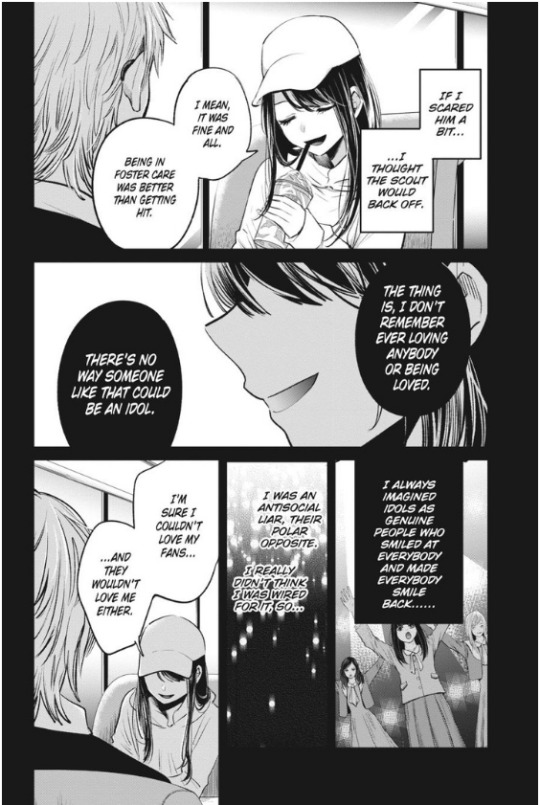
So, Ai's character is defined by these 2 ideas:
I have never been loved by anyone Nor have I loved anyone else
On the one hand she was never loved. On the other hand she has never loved. Because of this, she thinks of herself as a fake.
AI (PURPLE) = AQUA (BLUE) + RUBY (RED)
Ai has stars in both her purple eyes. Aqua and Ruby instead have only 1 star each. Moreover, Aqua has blue eyes, while Ruby has red eyes. The idea is very simple. They are Ai's 2 sides:
Aqua is blue, right, mind and an actor
Ruby is red, left, heart and an idol
Together they make Ai, down to her 2 parallel careers (as an actress and as an idol). That said, the twins' foiling with their mother gets deeper:
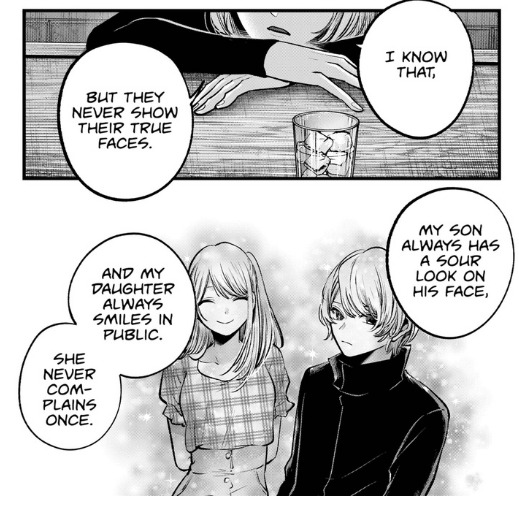
As Miyako highlights, both Aqua and Ruby are liars. It is just that they lie about opposite things. On the one hand Aqua hides his most positive and vulnerable side. On the other hand Ruby hides her negative feelings. Aqua always sulks, while Ruby always smiles.
Aqua suppresses his wish to love others and to be happy with them
Ruby suppresses her fear to be unloved and abandoned by those around her
In short, each twin explores one of Ai's complexes (to love and to be loved). They really are the 2 faces of Ai (love).
AQUA - THE UNLOVING ACTOR

Aqua's story starts with Gorou Amamiya:

Gorou is a person strongly defined by guilt, which is at the root of his backstory. His mother was a young girl, who died by giving birth to him. As a result, Gorou feels he lives at her expenses and does all he can to rectify this mistake. For example, he becomes an obstetrician, even if he really wants to be a surgeon. Not only that, but he ends up developing a saviour complex. He feels it is his failure that Sarina dies, even if her illness can't be cured and has nothing to do with Gorou's area of expertise.
So, it is really no surprise that once Ai arrives, he projects on her the 2 people he could not save:
Ai is Sarina's favourite idol and a young girl like her
Ai is a teenage mother and is desperate to give birth in secret, just like Gorou's own mother
Ai represents Gorou's chance of redemption and catharsis. He could not save neither his mom nor Sarina, but he can help Ai. She needs the kind of doctor he is and this time he can make things right. However, Gorou is negated this closure and gets killed and reborn as Ai's own son. A son, who is destined to witness his mother's death. This time again, Aqua is powerless and can't save Ai. So, the story repeats and Aqua is left broken:

Aqua's real wish is to save people, but he keeps failing, so he chooses the path of revenge. He becomes his own antithesis.
He feels he doesn't deserve to live happily with others, but his wish to connect is too strong and he ends up forging some of the deepest bonds in the series:
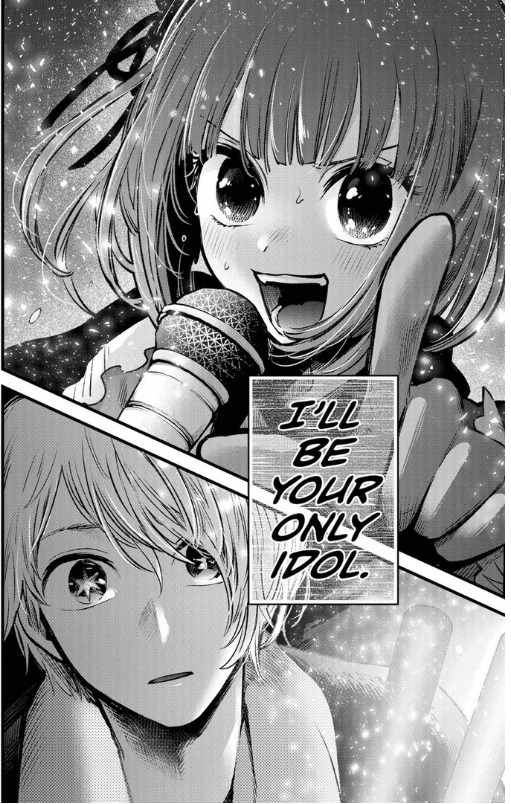
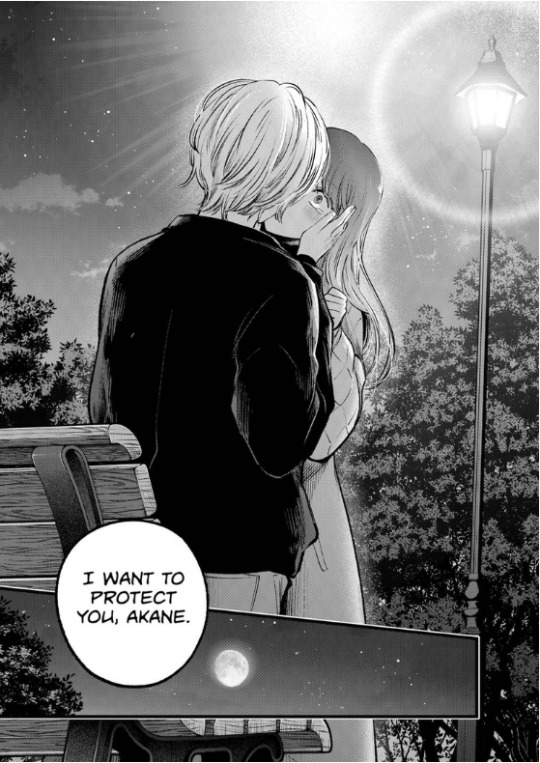
He insists he is only focused on revenge, but ends up warming up to Kana and Akane to the point he goes out of his way to support them multiple times. Even when it doesn't help his avenge quest.
This is made clear in recent chapters, as well. Aqua has decided to give up on all his bonds. He cuts ties with Akane, decides to manipulate Kana and betrays Ruby's trust. He insists he is ready to go to hell alone. And yet, even after he takes such a dark turn, he can't help, but to save Ruby:

As Crow Girl says, this is a bad move on Aqua's side. His revenge would be easier if Ruby hated him, but he lets his true feelings out. He tries to repress his love and care for others. And yet, it keeps manifesting through the cracks of his vengeful persona. Aqua decides not to love, but he still does.
RUBY - THE UNLOVED IDOL

Ruby's story starts with Sarina Tendouji:
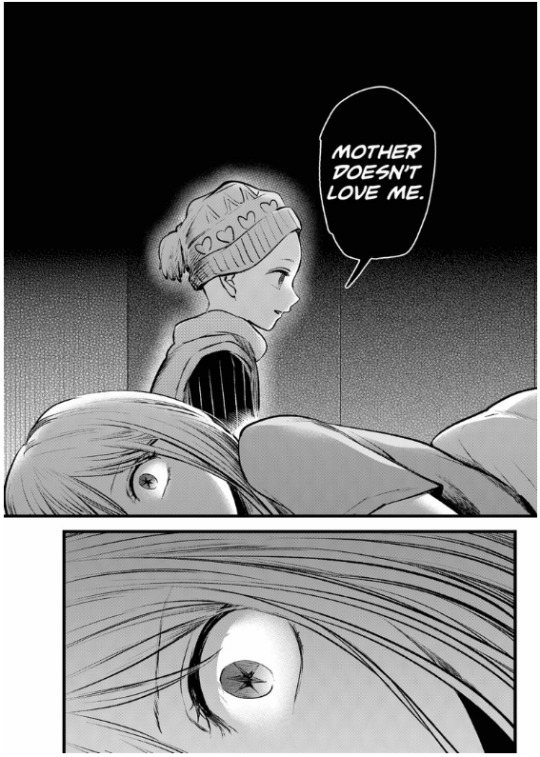
Sarina's life is doomed by her illness, which results in her parents abandoning her. Not only does she suffer physically, but she feels unloved. Despite that, she refuses to give up and laces on 2 people, who become her personal lights (stars):
Ai is the girl Sarina wishes to be. A person who is showered with love, as she shines brightly and moves freely on a stage.
Gorou is a parental substitude, as he is the only adult, who supports Sarina throughout her illness. He is even the person who stays with her, while she dies.
So, Ai and Gorou are around when Sarina's parents aren't, which is why she ends up idolizing them. Ai becomes some kind of ideal self, while Gorou becomes her first crush. The truth, though, is that they are the 2 pillars of Sarina's life.
Ironically, Sarina's make believe family becomes Ruby's real one. In particular, Ai becomes a mother, who loves her children with all her heart. This is healing for Ruby, who projects her wish for love on Ai:

It is Ai's strong emotions, which make it possible for Ruby to recover from the loss of her mother:
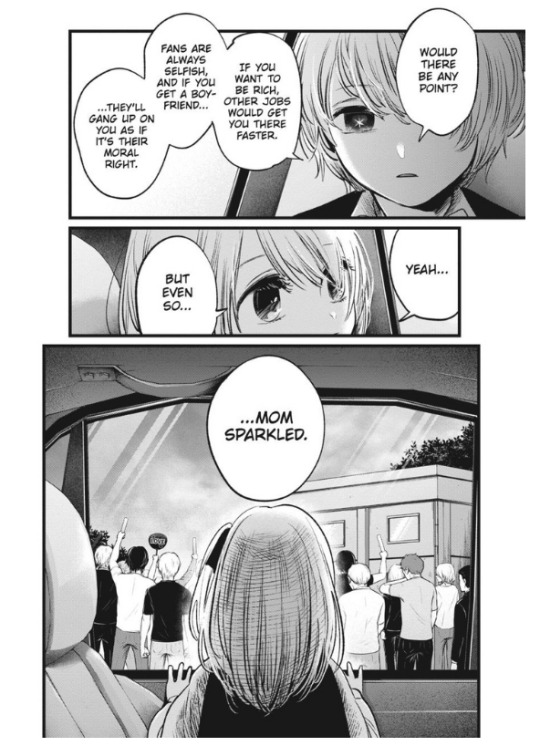
Ruby pursues the career of idol earnestly to become a star who never lies. And yet, she keeps lying to herself, as she refuses to confront Sarina's past. This negation is why her reaction to Gorou's death is so strong. This discovery becomes a catalyst for all of Ruby's negative feelings:

Ruby becomes her own antithesis and starts to climb up high through manipulation and lies. It is implied she weakens her relationships and later on she enters a violent fight with Aqua, which breaks their bond.
And yet, when Ruby hits rock bottom and confronts the painful truth that her parents have abandoned Sarina, it is Aqua who comes to her rescue:

Even if Ruby breaks their relationship and is prepared to live without trusting anyone anymore, she is still loved. The girl who fears rejection and abandonement is loved even in her darkest moment.
IDOL + FANS = MOTHER + CHILDREN

Aqua and Ruby are opposites. Aqua is scared to be loved and can't let go of Gorou. Ruby is scared to be unloved and can't face Sarina. And yet, they are also the same. Both project their deeper issues on both each other and Ai.
Gorou's feelings over his mother are projected on Sarina. Similarly, he projects his feelings for Sarina on Ai
Sarina's feelings over her mother are projected on Gorou. Later on, she decides to become like Ai because of her promise to Gorou
In short, Gorou wants to protect Ai because of Sarina and Sarina wants to become like Ai because of Gorou. As a result, Ai ends up as the object of their fantasies and wishes. A real godly idol.
Obviously, Gorou and Sarina's feelings towards Ai grow deeper and more complex as they are reborn as her twins. Slowly, their relationship goes from that of idol and fans to that of mother and children.
So, Aqua and Ruby's story is about overcoming the idealization of Ai. Both as fans towards their favourite idol and as children towards their mother. After all, isn't a mother their child's idol?
SUSANOO, AMATERASU AND MARIA
Among other things, the theme of idolisation is conveyed through the religious motif of the Hoshino Family.
Even the flowing sweats are beautiful Aqua These eyelids that hid the Ruby within
The lyrics reference the legend of Susanoo and Amaterasu:

According to tradition, the 3 god siblings Susanoo, Tsukuyomi and Amterasu are born from the creator god Izanagi. as he washes his face in a river. Tsukuyomi (Moon Goddess) is born from Izanagi's right eye, Amaterasu (Sun Goddess) from his left eye and Susanoo (Sea God) from his nose. In short:
Aqua is a composite version of Tsukuyomi and Susanoo. He has inherited Ai's right eye, like Tsukuyomi. However, the opening associates him to his mother's sweat, like Susanoo is born from Izanagi blowing his nose. Finally, his name links him to the sea
Ruby alludes to Amaterasu. She has inherited Ai's left eye, the opening links her to her mother's eyes and she herself mentions the goddess
This reference loosely comments Aqua and especially Ruby's arcs.
Amaterasu and Susanoo enter a fight, which leaves the Goddess crying and depressed. She hides in a cave and without the light of the sun, the world is left in darkness. The other Gods come up with a plan to lure Amaterasu out of her prison. In particular, the God of Enterteinment Ame-no-Uzume organizes a celebration for a new bright Goddess. Amaterasu gets curious and eventually comes out from the cave, so the world gets sunlight back.
Does any of this sound familiar?

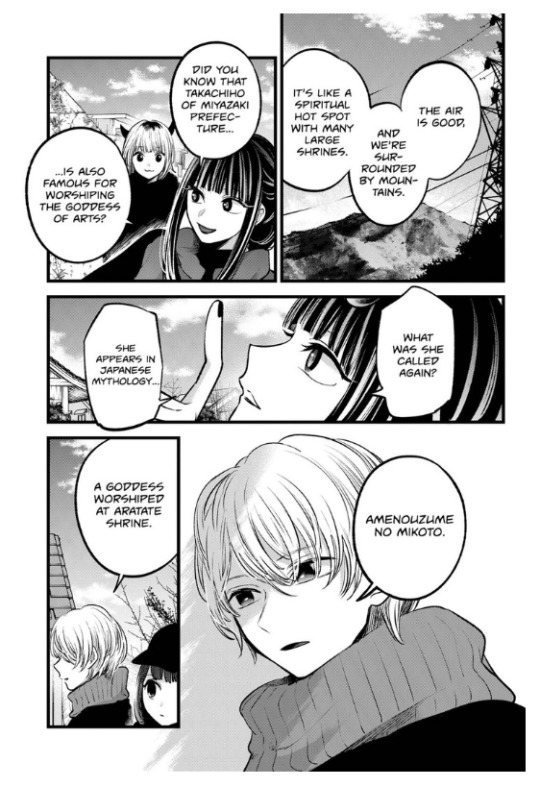
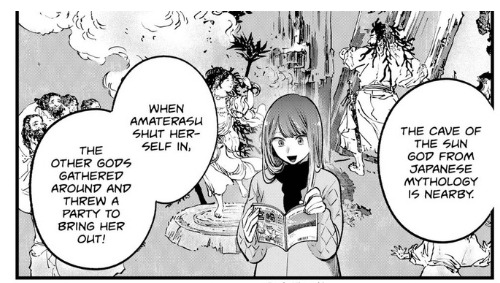
Ame-no-Uzume is mentioned multiple times together with Amaterasu. Moreover, the characters visit the Goddess of Enterteinment's temple and they metaphorically enter Amaterasu's cave:


What the story does is clear, right? Ruby's arc is loosely an inversion of Amaterasu's story.
The Sun Goddess enters a fight with her brother and hides in a cave, only to be rescued by the Goddess of Enterteinment. Ruby is guided by Crow Girl (who could be a composite character between Yagatarasu and Ame-no-Uzume herself) and enters a cave, where she finds Gorou's body. This leads to Ruby going through her eclipse phase, where her eyes go dark. Eventually, she is helped by her brother and she finds her inner light again.
It is possible that Aqua's story will mirror Susanoo's in a similar way. After all, the God of the Sea is famous for killing a monstrous serpent to protect a Princess and for finding a Magical Sword within the beast. This may reference Aqua's quest for revenge, who leads him to find a princess (Akane-Princess Saya) and a blade (Kana-Tsurugi). That said, it is too soon to say.
As a final note, Ruby and Aqua's fight ties into the mythological motif. After all, Amaterasu enters into conflicts with both Susanoo and Tsukuyomi. In Amaterasu and Susanoo's case, they go through a divination ritual, so that Susanoo can prove his good intentions. Susanoo passes the trial, but the aftermath leads to the siblings fighting. When it comes to Ruby and Aqua, Ruby gets angry at Aqua for betraying Ai. As a result, Aqua has to mend his bond with Ruby by revealing his past self. To do so, he proves his identity through the Ai-keychan (a divine sign). He passes the trial.
What's most interesting about these references is Ame-no-Uzume's role. The Goddess of Enterteinment is an ally of Amaterasu, but Crow Girl leads the characters towards darkness. Thematically, she may embody the darkest part of the enterteinment world, which finds fun in people suffering.
So, what about Ai? What is her religious symbolism? Let's turn to Christianity:
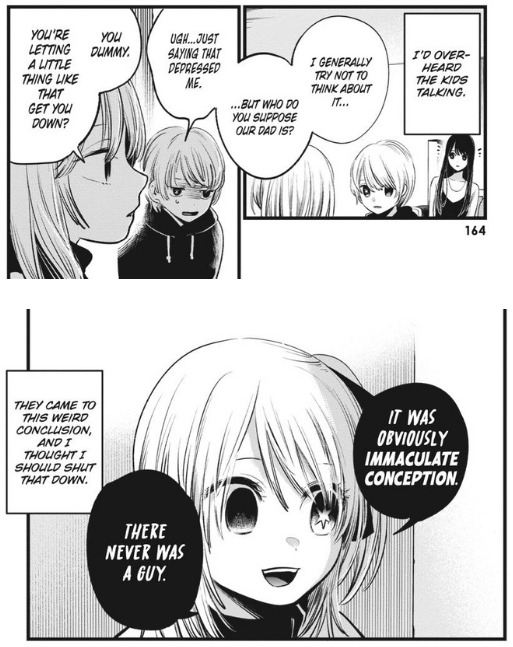
Sing, dance, flutter, I am Maria — Right, lying is the most exquisite form of love
Mary is famous for having Jesus, while still a virgin. She is so perfect that God chooses her to bear his child. Similarly, Ai is an idol and is requested to be pure, so for her to have a sexual partner is out of question.
Still, Aqua and Ruby's reaction to the idea of a father is interesting. It speaks of their idealization of Ai both as her children and as her 2 biggest fans. At the same time, it betrays a wish to repress everything related to the final member of the Hoshino family.
MEPHISTO

As @hamliet explains in her meta, Hikaru Kamiki's name means God of Light, which is a reference to Lucifer, the fallen angel turned king of hell. It is a fitting imagery for Ai's enemy. Ai is Aqua and Ruby's goddess, so her killer can only be the devil. Similarly, Lucifer betrays God and Hikaru betrays Ai.
So, what is known about Hikaru Kamiki? Only 2 things:
He was raped and forced to have a son when he was 11
He is a serial killer, who targets famous celebrities
In particular, it is probable Hikaru idolises Ai, just like his children do. As a child, he is raped by a woman, then he meets Ai and has a relationship with her. However, his unsolved trauma almost surely ends up compromising his story with the idol and he eventually kills her. Later on, he projects his feelings over Ai on women similar to her, whom he targets in a neverending cycle.
This psychological mechanism makes him the embodyment of the most twisted love possible:
He was loved wrong (he was raped)
He loves wrong (he kills women he is attracted to)
Given this premise, he is clearly going to be defeated and he will probably die in the end. Still, the way he goes down will be important for Aqua and Ruby, as it will decide their future, as well.
In general, Hikaru is probably meant to be a negative foil (a jungian shadow) to the twins, as he represents their darkest parts. In particular, it is gonna be interesting if he foils them not only on the main theme of love, but also on the theme of lies and truth.
Aqua explores the idea of lies. He hides things from others and manipulates them. At the same time, he also experiences how good beautiful lies can be (his happy life when he thinks his father died). Most of all, though, he embodies the idea that a lie can become truth and vice versa. For example, his most effective manipulation technique is to mix his true feelings with his lies. He tells Kana she is cute because he thinks so. He tells Akane he is interested in her as an actress because it is true. He manipulates both girls, but his feelings are genuine.
Ruby explores the idea of truth. She hates liars and doesn't want to lie even if it would help her become an idol faster. Still, she experiences how painful truth can be (her discovery of Gorou's body). This leads her to lie to both herself and others. In the end, though, an even more painful truth comes out (her parents do not love her). No matter how much Ruby tries to hide her feelings, truth will come out. And yet, despite how agonizing it is, truth also leads to happiness. She is devastated after seeing Sarina's mother again, but this lets Ruby and Aqua find each other as Sarina and Gorou. As a result, Ruby is now happier and stronger.
So, in which way may Hikaru foil his children here? There might already be hints:
Just like Aqua, Hikaru is a master at manipulating others with truth. After all, it is implied he manipulated his rapist's husband to kill her by revealing her infidelity. Similarly, he orchestrates Ai's death by telling an unstable fan about her pregnancy. Even when it comes to Yura Katayose, he openly tells the actress to watch her step. An open threath masked as advice.
Just like Ruby, it is possible Hikaru values truth and hates liars. This could easily tie in his backstory and explain why his relationship with Ai degenerates:
I shall lie today as well (Hey! Hey! Hey! Hey!) Hoping that one day, these words will become true (Hey! Hey! Hey! Hey!) And yet, still, (Hey! Hey!) I have been unable to tell you, and you, alone (Hey! Hey! Hey! Hey!)
Ai sees herself as a liar unable to love. This is obviously the real lie, as her heart is full of love. Still, it wouldn't be surprising if Ai's own issues exasperated Hikaru's fear to be used again. From what we know, it is probable Ai and Hikaru have feelings for each other, at a certain point. Then things go bad. What if Ai's inability to express her love and Hikaru's inability to understand lead to their breakout and eventual tragedy?
Obviously, this is all a theory, but one thing is sure. Ai and Hikaru's relationship is key for understanding their characters and their legacy to the twins. Still, Ai is already dead and Hikaru will die in the end. How can their story find a closure, then?
A WORK OF FICTION TO SHOW THE TRUTH
The climax of the series is building up towards the movie, which is gonna represent Hikaru and Ai's story.
Interestingly, Aqua is playing Hikaru, while Ruby is playing Ai. It is obvious a lot of emotional payoff rides on this. On the one hand it is gonna be a chance for Aqua and Ruby to sort out their feelings towards each other. On the other hand Kana and Akane will probably do the same, which will solve their love triangle with Aqua. (spoiler - KanaXAqua is probably endgame).
What is really interesting, though, is that the movie is set up to reveal who Ai really is. After all, the godly idol asks the director to film the real her and this request should be satisfied. Not only that, but Ai leaves her children 2 tapes whose contents are still to be shown. So, whatever Ai's legacy is, it will be made clear. This is true also for her bond with Hikaru:

So, does Ai forgive Hikaru or not? Her children seem to believe in the latter. However, the former is probably true.
First of all, it is probable Ai realizes Hikaru is behind her murder. The stalker arrives with a bouquet of white roses, which are associated to Hikaru. Moreover, Hikaru is the only person, who knows both about the twins and the new address. Secondly, Ai shows no rage nor fear for the fan who murders her. The man is clearly a stand-in for Hikaru in the scene. Despite his actions, Ai does not lose time hating him, but spends her final moments affirming her love for her and Hikaru's children. In short, Ai possibly knows of Hikaru's involvement, but doesn't regret their kids.
Still, will Aqua and Ruby portray this in their movie? And does Aqua's revenge ride on Ai's forgiveness or hate towards Hikaru? Will the twins understand their mother?
Whatever the result, it is probable Aqua and Ruby will eventually run into their father. In particular, Hikaru is set up as a threath to the 3 main girls:
He sends Akane white roses and she is determined to stop Aqua's revenge, which may put her in harm's way
He is the thematically opposite of Kana. He embodies twisted love and twisted truth. She embodies healthy love and genuine feelings
Finally, there is several build up towards him trying to eventually kill Ruby:
He comments that Ruby is growing up beautiful
He kills Yura, who is the original first choice for Ai's role
Ruby ends up playing Ai in the movie
If this third scenario becomes true, it could give closure to all the character arcs. Ruby may empathize with Ai and forgive her father. Aqua may be given the chance to save Ruby (symbolically both Ai and Sarina) this time. Finally, the outcome may offer catharsis to Hikaru before he dies. In short, I think Hikaru is gonna die, but that the twins are not killing him. Rather, they are gonna understand their mother's feelings and survive their parents' tragedy.
A SECOND CHANCE
Hikaru and Ai's story is a sad one, but Aqua and Ruby's is gonna have a happy outcome. After all, the whole series is about overcoming death and getting second chances.
Gorou and Sarina both go past their deaths and are given brand new lives
The new B Komachi is a second chance for all its members. It is a second chance to live for Ruby, a second chance for Kana's career, a second chance to fulfill Mem-cho's idol dream. Finally, it is the second chance of Ichigo and Miyako's wish to come true
Miyako and Ichigo's love story will also be given a second chance
The movie is the director's second chance to realize Ai's wish to film her real self
In short, this theme is everywhere and it is possible the series ends with B Komachi performing in a dome, exactly as it starts. This time, though, things will go well.
Still, doesn't something feel odd? After all, if the series is about second chances, why isn't Ai given one?
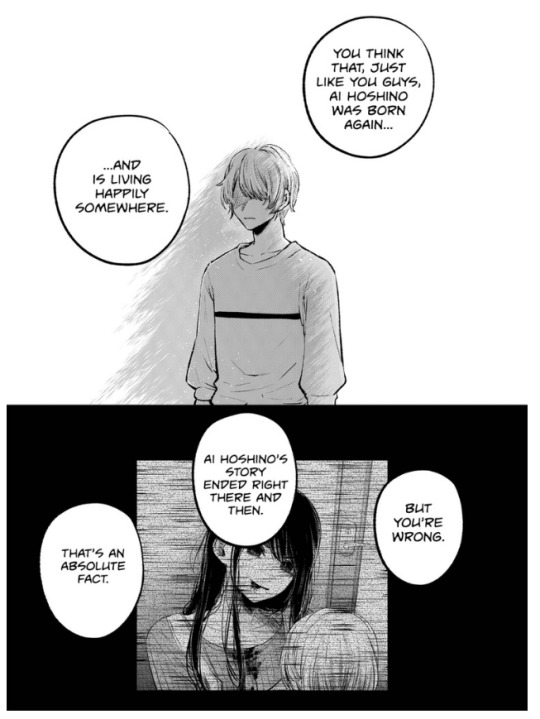
THE REAL AI (TRUE LOVE)
I think there are 2 reasons Ai isn't reborn:
1- Aqua and Ruby are Ai's second chance
The twins are Ai's legacies and will fulfill her dream for her:
Someday, surely, I will have it all in hand I am such a greedy idol Because I wish to love everybody properly in a life-sized way
Ai's wish is to reconcile her family with her idol career. She wants to love both her children and her fans. She wants it all. Well, Aqua and Ruby come to embody these 2 different forms of love:
Aqua is given a lot of focus when it comes to personal relationships. An important part of his arc is his feelings for Akane and Kana and he is not that much interested in the enterteinment business per se. In the end, he may also choose to fulfill his dream to become a surgeon
Ruby's dream is to become an idol, who shines even more brightly than Ai. Moreover, Ruby's wish is pure in how she doesn't want to lie nor to manipulate others to get there. She is right now also stepping into the role of actress, so by the end Ruby may catch up and surpass Ai in both her careers (idol and actress)
In other words, Aqua may live the love of a happy relationship and family, while Ruby may live the love of openly loving the world and people in general. Whatever the case, Aqua and Ruby will fulfill Ai's main wish which is for them to grow up healthy and happy.
2- Ai doesn't need reincarnation because she in fact does fulfill her dream
Ai wants to love both her family and her fans, which is what she does at the very end.
She remembers the stalker's name and his present. She proves to him she never took her fans for granted
She is able to tell her children she loves them and realizes she is not lying
Ah, I've said it now at last This is definitely not a lie; I love you
Ai's wish is to love and to be loved and she gets it through her twins. Aqua and Ruby feel they owe their mother something and that it is cruel they get to live a second life, while Ai doesn't. Still, they are wrong. If Gorou and Sarina were not reborn, Ai would have had a stillbirth, which would have broken her. Just by existing, they fulfill Ai's dream. They give Ai the love she so desperately craves.
By the end, Hoshino Ai becomes the embodyment of true love. True love isn't perfect. It is complicated, as people struggle and make mistakes. Still, if the wish is genuine enough, it shines incredibly bright. So does Ai, not as an idol, but as a real person (the true Ai).
#oshi no ko#oshi no ko meta#oshi no ko theory#ai hoshino#aqua hoshino#ruby hoshino#hikaru kamiki#my meta
180 notes
·
View notes
Text
Losing the Prophetic

Marc H. Ellis
This week Jewish theologian Marc H. Ellis died at the age of 71 following an extended illness. Marc’s work strived to define a Jewish theology of liberation. His writing and speaking over several decades influenced a countless number of people all over the world, myself included.
We were very lucky to have Marc as a writer at Mondoweiss for several years where he wrote a column called Exile and the Prophetic. That name speaks to a great theme of Marc’s work: the battle between Empire and the prophetic within contemporary Jewish life.
For Marc, the prophetic, or the challenge to power, was the true meaning of Judaism. This is a topic he and I would debate. His belief in a Jewish particularity versus my admittedly secular belief in the universality of the call to justice (which in truth he would never deny). And yet, he would insist that it was this prophetic imperative that Jews are uniquely called to wrestle with, especially in the present age with the advent and domination of Zionism. In his first column for us he wrote, “The prophetic is our indigenous. It is exploding right before our eyes.” This is the story he told through the decades of his work.
To Marc, the true core of Judaism was being sacrificed at the altar of Zionism, or as he often called it Constantinian Judaism, the toxic marriage of religion with state power. If you ever saw him speak or read his writing you are likely familiar with the vision he would recount of imagining an Apache helicopter gunship flying out of a Torah ark during a sabbath service. As you can imagine his work is more relevant today than ever.
There is one article of his that we published more than 10 years ago that I’ve thought about often over the last 8 months of the Gaza genocide. In that article, titled “Burning Children,” Marc returned to one of the great themes of his work – how American Jewish life and theology has been shaped by the experience of the Nazi Holocaust and the challenge that Jewish oppression in Palestine presents to this worldview. In the article he references Rabbi Irving Greenberg who helped shape post-Holocaust Jewish theology in the U.S. and writes:
It was in a 1974 essay that Rabbi Greenberg first wrote about the burning children of the Holocaust as a challenge for the Jewish future. I have quoted this passage often: “After the Holocaust, no statement, theological or otherwise, should be made that is not credible in the presence of the burning children.” Rabbi Greenberg’s invocation of burning children came to life in a different way for me when I visited Palestinian hospitals during the first Palestinian Uprising in 1988 and 1989. There I saw Palestinians of all ages but mostly teenagers who had been shot by Israel’s “rubber” bullets. Some were struggling for life. Others were already brain dead. I visited with the parents and siblings of the injured. Above the beds were martyr photos of the children framed by kefiyas. After I left the hospitals, I wrote a poem about my experience. I used Rabbi Greenberg’s haunting word about burning children to express my experience in the hospitals. In the poem I asked if these Palestinian children weren’t, like the children of the Holocaust, burning too. I felt the Palestinian children I saw were in many ways “our” children. We share a common humanity as starters but for Jews I knew that their “burning” was our responsibility. Though unintended by Rabbi Greenberg, his Holocaust statement has broadened to include Palestinians who are “burning,” this time at the hands of Jews. What theological statement can we make about God that makes sense to the burning children of the Holocaust – and Palestine?”
And he ended the article, written in 2014:
Chastened by history, indeed, Jews are – by the Holocaust and now by Palestine. For in Gaza right now children are burning everywhere.
I thought about Marc often this past week as we published, and imagined the discussions we would have had. How can one not mourn and rage at the unimaginable crime of burning children after reading Reem Hamadaqa’s devastating recounting of the Israeli attack that killed 14 members of her family, or in the essential reporting Tareq Hajjaj shared from the massacre in Nuseirat refugee camp. In that report, 11-year old Tawfiq Abu Youssef told Mondoweiss, “I stayed under the rubble for hours. I did not think for a moment that I might survive and see life again. I had lived through death enough while I was under the rubble. That was death.” I imagine Marc would summon these stories to demonstrate the fight against empire remains central which is why the repression we face, even in the U.S. continues to deepen.
He would also be the first to point out that the prophetic, even if weakened, refuses to submit. I know he would have responded vigorously to Anna Rajagopal’s searing indictment of the discourse over “Jewish values,” and despite the Jewish community’s overwhelming embrace of “Empire Judaism” he would raise up those charting a different path forward.
One moment I will never forget with Marc was a conversation he and I had years ago, as I was editing one of his articles. He told me, whether we knew it or not, our work at Mondoweiss was documenting the end of Jewish ethical history. I was struck then at the power of the statement and remain so today. As I reflect on Marc’s passing this is not a responsibility I take lightly.
Marc will be missed deeply and yet it has never been more clear that his legacy and work will live on. As Marc would likely say, the prophetic cannot die. In fact, Marc told us as much in his own words, “The Jewish prophetic will survive; it will continue to accompany and haunt those Jews who enable and perpetuate injustice against Palestinians.”
#israel#genocide#israel is a terrorist state#gazaunderattack#free gaza#gaza strip#jerusalem#free palestine#gaza#palestine#jews#jews against israel#jumblr#jewish history#israeli#jewish#judaism
41 notes
·
View notes
Note
what are your thoughts or opinions about the afterlife in hp? and what do you think about the trope where jily are able to watch down on all the things that are happening to harry and co. in real time?
thank you for the question i think about this a lot!!! i cried writing the end of this lmao.
soooo i do not like the looking down on everyone trope. i've never liked the idea of people just being up in heaven, watching. it sounds like a horribly boring thing to do for eternity, and i think it's a cop out. death is permanent.
i DO have thoughts about the afterlife in hp. they kind of mix with my thoughts about the afterlife in general. i don't believe that when we die a "self" remains in a way that would be recognizable to humans. i like what chidi on the good places says
That’s one conception of death for a Buddhist. The wave returns to the ocean — where it came from, and where it’s supposed to be
and people are the wave. i apply this to hp too, i do not think anyone is sitting around waiting to be called on by the resurrection stone or by a dead-not-dead loved one taking a stop in the afterlife train station.
yet, we see memories of people with knowledge beyond the "creator" of the memory, and to some extent, wills of their own. to me, when the imprints of people appear in the living world, it is a very complex bit of magic that pulls from the past and memory and emotion. we all leave imprints in the places we go and in the people we meet. not even voldemort can run from this.
so, then, the train station.

there is, in Judaism, a concept of being guided by your loved ones to the next phase of the afterlife. in Judaism and Islam there is a concept of soul purification in Gehenna/Jahannam, which is like Hell, wherein the soul experiences the outcomes of all they caused in their life. once they have been purified, they travel onward. this experience for a person who dies and comes back, is obviously thought to be mental, the brain's way of coping with dying.
we see loved ones guide harry on his way to death, and dumbledore says that his conversation with harry is all in his head.
when someone dies in hp, i believe their soul/mind travels to a place of comfort and a place of transition, and they are led on the path to the afterlife by a loved one. once they are there they undergo the purification through a long talk with their loved one. the loved ones aren't waiting around to do this, it's kind of life the wave rises for a moment, but it is not the exact same person.
harry goes to King's Cross bc trains=travel and because this represented his freedom, his journey to his true home.
when james dies, i think his dad is there to guide him on. james had plenty of places of comfort, but perhaps he finds himself walking through a field near the house he grew up in with his father. it's a path he'd taken many times, to walk into town with his friends, to call lily on a payphone, where he rode his broom, where he played as a child. so all parts of his life are there. he works through all of his guilt, the pain of betrayal, mourns, and is at peace.
when lily dies, i think james is there to guide her. he's able to explain everything, even though irl only moments have passed. i'm not sure where they would be, tbh. i think transitions were hard for lily bc she never felt at home in either world. maybe she's on a front porch at the end of a party. about to go home, happy and warm from time spent with friends. it doesn't matter the house. james and lily have a long talk on the front porch, and when they're done, the lights go off, and the party is over, and she is happy and at peace.
when sirius dies, james is there to guide him. they're in the forbidden forest, as in english folklore forests are places in-between, and because this is one of the places sirius was happiest. a time when helping his friends was a complete act of joy, not complicated and hard and sad. james tells sirius that it's okay, that he's suffered enough, and sirius gets to let go of all the pain he'd endured since he was a kid. he is at peace
when remus dies sirius guides him. remus is also in the forbidden forest, since this is one of the few places he was able to feel free (both as wolf and as man) even if there was guilt after. they tell each other they love each other. again, the pain is worked thru until remus is at peace
i want to do peter but it's hard to say. maybe his mother guides him, maybe he's at a place from childhood before everything got so complicated. maybe he's in the forbidden forest, too. if someone we know guided him, i think it would be james or lily. it isn't about what james or lily want, they are at peace, they don't care, and is it even really them? peter will be feeling his pain for a while, but in the end it will be okay. he will get peace, too.
#m#ask#Anonymous#james potter#sirius black#lily evans#remus lupin#peter pettigrew#marauders#text#analysis#my hcs#jily#harry potter
15 notes
·
View notes
Note
Yo, so this is less so a specific ask and more me having the need to verbalize some stuff with the option of getting input from someone with a more knowledgable perspective. I have been thinking a fair bit about Judaism and dabbling with the idea of converting to it. I don’t think it’s something for me, but I am tentatively thinking about the option.
The thing is. I assume you’re familiar with the difference between hard magic and soft magic systems in writing. (If not, the tldr is hard magic is defined with hard rules and limitations and soft magic is more ambiguous and fluid.) And I think my basic thing is that I am very open to what you could call soft spirituality and faith, but unable to jell with any hard beliefs.
For example I can never get myself to really entertain the idea of an afterlife being set up in a very specific way with specific rules and where you know what is happening and why. But I saw that tweet that went around a while ago that was like “I hope that death is like being a child at a party and falling asleep, so somebody carries you to bed and I hope when I die I can still hear the laughter from the other room” and that fucked me up beyond words.
I have gone through a couple religions and beliefs over my life and never found a framework that really fit with me, but in the past couple of years I have developed a lot and realized I have a yearning for spiritual things. My current view could probably best be described as a pantheist leaning agnostic enamored with the idea of belief and experience shaping purpose and giving structure… sort of. As well as the power of belief and to change the way you see the world for the better. It’s hard to explain specifically the angle I like.
The reason I am caught up on Judaism rn is that in a lot of ways it seems to be based around a lot of soft spirituality. I am absolutely in love with the idea that god, or the divine, or spirit, whatever one may call it is not something concrete, not one existence, but more of a force like the laws of physics, or the rules of math. I adore the idea of little rituals and rules to bring god into your life and through that connecting you to culture and history and people and community and spirituality. I love the idea you talked about some time in the past of the four kinds of jews, based on studying the scriptures and following the rules, and that even those who do neither are still a vital part of the jewish people and are needed for it to be whole. There’s so many little details that appeal to me so strongly, because they’re exactly the kind of stuff I am yearning for.
But I feel like the hard aspects keep me away. I love the idea of rules and rituals to shape your life, but I don’t think I could follow the rules of Judaism, because having a preset set of rules feels too hard for me. Similarly I love the idea of studying the texts and the never ending pursuit of decifering the meaning and arguing about it, but I don’t think I could get interested in ever doing it, because having a specific text to do it with is too hard.
So I feel very conflicted, because the way Judaism feels to me from the outside, it shows me both the soft aspects of spirituality I absolutely adore and yearn for, and at the same time the hard aspects that keep me away from religion. And they feel very connected and interwoven.
And it feels like especially as a convert being a part of it is connected with a huge amount of the hard aspects and a lot of work that goes into those. I’d have to first figure out if there is even any jewish denominations (is that the right word?) near where I live that don’t do circumcision and that aren’t on the conservative side (I have no idea how the situation is where I live) and then do all the studies and the entire process involved in converting (which I admittedly don’t know very much about either, so I might be overstating this) to be part of something I would immediately take a half step away from because I’m only really interested in the ideas behind the actual elements of it and not as much the elements themselves if that makes sense?
I guess this is pretty rambly, but maybe you have some input, or something smart to say and if not I hope I’m not coming across as this guy right now:

I think that in the process of writing this ask, you seem to have figured out that this isn't for you right now. If you get to a point where all of those things aren't standing in your way but are a to-do list, that will be when you know it's for you.
And they're generally called movements, not denominations.
32 notes
·
View notes
Text
Arlecchino, Penguins, and Angels
This theory has a bit of everything.
Naming Parallels
Perinheri- the in-game book confirmed to be related to Arlecchino's past by her 5th character story
Peruere- her birth name
Pers- Freminet's pet penguin's namesake, readable as the in-game book Tales of a Snow-winged Goose. This is based on Mother Goose from our world, which has a harlequin variant. This book also includes a story about a "Princess Marcotte" who is clearly meant to be Clervie.
Le Père- the French word for father
Male penguins- that is to say, father penguins- famously go great lengths for their children.
Hleobranto Innamorato & Blade Runner
Hleobranto Innamorato is the other name for the book Perinheri, and seems to be based on our world's Orlando Innamorato and Orlando Furioso books. In volume two of Perinheri, we hear about Hleobrant and his unrequited love for Angelica, which parallels our Orlando books.
This is further corroborated by the local legend Fairy Knight Twins, Angelica and Medoro. In our Orlando, Medoro is the man Angelica ends up with. The achievement for defeating them is called "Tears in the Rain", a reference to the Blade Runner monologue that is repeated in Tales of a Snow-winged Goose with the line "from red giants to white dwarfs, from the shoulder of Orion to the glimmering Tannhauser Gate..."
The central theme of Blade Runner is the divide between the humans and the replicants, something paralleled in Perinheri and Tales of a Snow-winged Goose. In Perinheri, it says that the Crimson Moon dynasty existed before birds split into domestic and wild kindred, and Tales of a Snow-winged Goose says that seagulls split into two races; seagulls, which continue to fly; and auks, which would never take to the skies again. Clearly, the metaphor here is that humans have split into two races.
It wasn't until I watched this video that I began to understand what these parallels might mean for the overarching storyline. Crucially, the replicants are soldiers for an interstellar war designed so that humans don't have to fight.
Angels & Seelies

This is Arlecchino's boss form. Typically, she has just half a wing, but here, she has six. I most frequently see this design being likened to the appearance of a spider (which would match visually with the Black Widow), but I see this has the six wings of a seraph. In Judaism, seraphim are angels associated with fire, constantly burning; seraph means both "burning" and "serpent".
I don't think it's a stretch at this point to say that Seelies are angels. In fact, there are measures to prevent Seelies from falling in love (and having offspring) with humans- why would this be? Perhaps to avoid creating a Nephil, as might happen according the Book of Enoch (which Genshin takes inspiration from). The Earth is understood in Jubilees and Enoch to have been flooded, inp part, for the sins of the Nephilim, which included drinking blood.
Kaeya & the Blessing of the Crimson Moon
Arlecchino can use the blessing of the Crimson Moon's blood, probably due to her lineage. The same goes for Kaeya, who, like Arlecchino, isn't effected by the "curse of wilderness" which Chlothar says turns all but pure-blooded Khaenri'ahns into monsters.
If you read the lore for Arlecchino's weapon, the Crimson Moon Semblance, you will understand the connection. The drinking of wine symbolises receiving the blood, and the blessing, of the Crimson Moon. How does this connect to Kaeya? Recall his father's letter from Hidden Strife. The Alberich clan are connected to the concept of purifying flame, the same concept as purgatory.
The Wagner Section
For me, every great Genshin Impact theory needs a reference to the operas of Wagner. In this case, it's the "Tannhauser gate" line in the Blade Runner monologue, a possible reference to Tannhäuser, the opera. It follows a bard of sorts and his infatuation with Venus and her underground realm "Venusberg". The evening star in our world is in fact not a star at all, but the planet Venus, and is associated with the fallen angel Lucifer (the demon to which the Ars Goetia's Paimon is obedient to). Khaenri'ah, the underground nation with its star motif, seems to reference Venusberg.
21 notes
·
View notes
Text
Philosophies of Sumeru
I have to wonder how deliberate were the choices for inspiration in the Sumeru region
The rainforest is mainly inspired by India, followed by Iran. The two countries have common ancestors, so their religious practices had an early shared worship of nature and some of the religious doctrine meets at certain parts.
More importantly, the ancient Persian religion, Zoroastrianism, was founded by Zoroaster —more commonly known by the name of Zarathustra in the book Thus Spoke Zarathustra by Frederick Nietzsche

Zoroastrianism holds monotheistic beliefs in dualistic cosmology of a world at conflict with good and evil, where people have the free will to choose between the two. This influenced the abrahamic religions (Judaism, Christianity, Islam) which largely have shaped society in the west (and beyond by the colonizing hand)
Nietzsche called himself an immoral, as he rejected the traditional values imposed by western religious institutions, his borrowing of Zoroaster's figure was deliberate as he wanted him to be the voice of rejection of the code of morals he originated:
From Ecce Homo by Nietzsche
People have never asked me as they should have done, what the name of Zarathustra precisely meant in my mouth, in the mouth of the first immoralist; for that which distinguishes this Persian from all others in the past is the very fact that he was the exact reverse of an immoralist. Zarathustra was the first to see in the struggle between good and evil the essential wheel in the working of things. The translation of morality into the realm of metaphysics, as force, cause, end-in-itself, is his work. But the very question suggests its own answer. Zarathustra created this most portentous of all errors,—morality; therefore he must be the first to expose it. Not only because he has had longer and greater experience of the subject than any other thinker,—all history is indeed the experimental refutation of the theory of the so-called moral order of things,—but because of the more important fact that Zarathustra was the most truthful of thinkers. In his teaching alone is truthfulness upheld as the highest virtue—that is to say, as the reverse of the cowardice of the "idealist" who takes to his heels at the sight of reality. Zarathustra has more pluck in his body than all other thinkers put together. To tell the truth and to aim straight: that is the first Persian virtue. Have I made myself clear? ... The overcoming of morality by itself, through truthfulness, the moralist's overcoming of himself in his opposite—in me—that is what the name Zarathustra means in my mouth.
Nietzsche developed his ideas at a time where the Enlightenment had disproved many Christian beliefs, hence his declaration that "god is dead", in the face of scientific proof against belief the faith people had in their religion was dying. With this loss of hope also came a loss of meaning, since there was no longer a reassurance in Paradise or an all powerful god behind creation. Nietzsche believed the loss of meaning would lead people into nihilism, an apathetic state in which people let themselves be dominated like a herd.
Nietzsche was initially influenced by Schopenhauer, another philosopher who basically ripped off the Buddhist conception of suffering as an unavoidable truth in the world, and built his westernized ideas from there without following Buddhist teachings themselves. He believed that behind this suffering, humans were motivated by the "will to life" as a survival mechanism. Nietzsche, on the other hand, believed in the "will to power" instead, meaning that life was motivated by the desire to dominate or be dominated.
To combat nihilism, Nietzsche proposed the concept of the "overman", a man who would embrace life for what it is and create his own values to give himself meaning in the universe. These new values would replace those imposed by religious institutions and would lead the herd of people.
Now let's examine the Sumeru chapter under Nietzsche's lens: the god of wisdom, Lord Rukkhadevata, has died. The people of Sumeru have become overly reliant on the Akasha, now containing knowledge manually handled by the political class which doubles as religious caste (the Chinese name of the Akademiya is Sumeru Institute of Religious Decrees). The sages manufacture an artificial "overman" they want to turn into their new god. And in the fairytale where Nahida hid Scaramouche's memories, he threatens:

The resolution, however?
The overman does not succeed.
It fails.
Azar is overthrown and the artificial god is defeated with the collective power of Sumeru citizens. Alhaitham as well, being the closest to an overman in the region, refuses to "lead the herd" to follow his personal values when he resigns as Acting Grand Sage.
Nietzsche's philosophy arrived in India at a time where the nation was under British colonial rule. Among the most prominent figures in anticolonial movements and education, Rabindranath Tagore stands out the most, a polymath who funded his own school where he taught arts alongside science and brought education to rural areas.

Like Nietzsche, Tagore wanted to break from the rigid traditions of religion and build a society with new values. But unlike Nietzsche, his philosophy was based on humanistic values and unity with the world, both nature and community, as he was mostly influenced by Indian religious philosophy, especially the concept of Brahma, a divine universal consciousness that originated everything in existence, therefore, it exists within every part of creation. The story of Apep in Sumeru is somewhat similar.
Another defining difference is their view on Zoroaster/Zarathustra: while Nietzsche is critical of the influence in morality he left, Tagore describes it this way:
All religions of the primitive type try to keep men bound with regulations of external observances. Zarathustra was the greatest of all pioneer prophets who showed the path of freedom to man, the freedom of moral choice, the freedom from the blind obedience to unmeaning injunctions, the freedom from the multiplicity of shrines which draw our worship away from the single minded chastity of devotion.
...Man realizes his divine self in his religion, his God is no longer an outsider to be propitiated for a special concession. The consciousness of God transcends the limitations of race and gathers together all human beings within one spiritual circle of union. Zarathustra was the first prophet who emancipated religion from the exclusive narrowness of the tribal God, the God of a chosen people, and offered to the universal Man.
... Zarathustra was the first who addressed his words to all humanity, regardless of distance of space or time.
For Tagore, a monotheistic doctrine offers a foundation of goodness as an ideal of perfection for all people. That is to say, it seeks the collective well being of a community and reflects the goodness of god on the people that follow him.
The motto of the religion "good thoughts, good words, good deeds", which means that good thoughts lead to good words which lead to good deeds, is echoed in all three versions of the three talent books in Sumeru (admonition, praxis and ingenuity)

He also compares the altruistic acts of self sacrifice to the philosophy of Indian tradition:
The orthodox Persian form of worship in ancient Iran included animal sacrifices and offering of harms to the daevas. That all these should be discontinued by Zarathustra not only shows his courage, but the strength of his realization of the Supreme Being as spirit.
...It has been a matter of supreme satisfaction to me to me to realize that the purification of faith which was the mission of the great teachers in both communities, in Persia and in India, followed a similar line. We have already seen how Zarathustra spiritualized the meaning of sacrifice, which in former days consisted in external ritualism entailing bloodshed. The same thing we find in the Gita, the deeds that are done solely for the sake of self fetter our soul; the disinterested action, performed for the sake of the giving up of the self, is the true sacrifice. For creation itself comes of the self sacrifice of Brahma, which has no other purpose; and therefore, in our performance of the duty which is self sacrificing, we realize the spirit of Brahma.
Where Nietzsche ethical law of will to power calls for men to realize themselves through individualism, making their own values the dominating truth of the rest, Tagore believes in a unity of all, nature, community, god and man to seek their shared and ideal values.
The philosophical ideals of Sumeru, likewise, are met in community, collectivism and altruism. The region never lost their god after all, she was just imprisoned by those with individualistic values and hubris.
I always say that I'm interested in the religious dynamic of the Akademiya as an institution of education. Seeking knowledge is a faith in itself, since their god has her domain in wisdom.
Tagore quotes Dr Geiger on Zoroastrianism as such:
The revelation [Zarathustra] announces is to him no longer a matter of sentiment, no longer a merely undefined presentiment and conception of the Godhead, but a matter of intellect, of spiritual perception and knowledge. This is of great importance, for there are probably not many religions of so high antiquity in which this fundamental doctrine, that religion is a knowledge or a learning, a science of what is true, is so precisely declared as in the tenets of the Gathas. It is the unbelieving that are unknowing; on the contrary, the believing are learned because they have penetrated into this knowledge.
I also find it entertaining that, as we know, ancient Greek philosophers make up the foundations for modern western philosophy like that of Nietzsche's. Ancient Greek philosophers also borrowed from Zoroastrianism in a sort of exotized way, just like their modern western counterparts borrowed from Indian tradition without minding much the credits.
#im not in good health to be able to write an appropriate post but its been on my mind#genshin lore#sumeru#and dont get me started on egoism and altruism in relation to alhaitham and kaveh#genshin analysis#long post
10 notes
·
View notes
Note
i need your thoughts on hope and lyall NOW. this is mostly unrelated but i love the idea of remus also having a little sister 😣
ask and you shall receive (also thank you for giving me an excuse to talk about them they’re my only thought for the past few days)
i have mainly been thinking about them in a non-magical au
okay so, hope is this really loud and outspoken girl, she speaks out about anything that she deems to be wrong. she’s also extremely intelligent. it’s the fifties but she manages to get into university at 18, she’s the only girl in the class and she’s studying classical literature. during the first lecture, no one is sitting next to her, looking down on her for both her age and gender, until a 21 year old lyall walks up to the desk asking if the seat next to her is taken. after that they’re sitting next to each other every lecture, they’re both flirting with the other but are oblivious that their feelings are returned
one lecture, hope is arguing with the professor about the reading list and lyall is just simping over her. it’s in that moment where he decides he’s gonna ask her out, it’s better to try and fail than never try and not know. except, in true holyall fashion, hope beats him to it by mere minutes asking him out first
they meet in september and by december of the same year they’re engaged, but they’re slower to get married because i am a strong believer in (ethnically) jewish hope and lyall who was born and raised atheist. her parents are approving of her engagement, in a “but daddy i love him” (by taylor swift) way. she doesn’t care for whether or not he’s jewish (although since she was a kid she’d always imagined marrying someone who was) but he wants to do everything correctly and he ends up converting to judaism out of his own choice. they’re married in early 1959 and in spring of the year after remus is born
i am a very large supporter of #stophopeandlyallhate i believe they were good parents and i will not take anyone’s word against that 😋
i also need to mention that they are both tall, hope is around 178cm/5’10” and lyall is around 189cm/6’2” but hope is definitely the type of person to always be wearing heels so she ends up being more or less the same height as lyall most days
they both have larger than life personalities. both of them are extroverts which was always a stark contrast to remus who was always very much an introvert
i could honestly yap about them forever it’s so bad
also, i have never truly thought of remus having a younger sister, and i will probably always be an only child remus believer, but now you mention it, i kinda fw that. yes yes i like it
my pinterest board



#holyall#whats the shipname tho#hope x lyall#i love them so much#theyre in love your honor#ev answers!! 𖤓#i will yap abojut them forever if i am given the chance to please send me all the asks ever#evan’s hope and lyall 𖤓
13 notes
·
View notes
Text
An Ultimate Revise: Who Or What Is Satan?

⭒☆·━━━━━━━•( 🕸 )•━━━━━━━·☆⭒
Okay... So I have a lot to say before I get into this post, because the original blog post I made was extremely problematic and I would like to address it, first and foremost.
My original "Who Or What Is Satan" post that I wrote was meant to be an educational and historical post, but it ended up being far from historically accurate whatsoever. It was full of errors and antisemitism, and I had absolutely no idea what I was talking about.
And so I've decided to completely rewrite and revise the entire post from scratch. It's something I've been wanting to do for a while now, because I really hate how my original post turned out and how antisemitic it was.
So without further ado, here is the revised and rewritten version of my original post, minus all the bullshit lol. Strap in, because this is gonna be a looong post! Full blog post is under the cut. ↓
⭒☆·━━━━━━━•( 🕸 )•━━━━━━━·☆⭒
So here's a little more info and backstory on the original "Who Or What Is Satan" post, before we get into the revised version;
⚠️ - TRIGGER WARNING: Antisemitism - ⚠️ About a year ago now, I wrote a blog post of the same title under the username of @/thebaphometicforest. At the time of writing that post, I was extremely uneducated and new to Daemonolatry, and I had also been almost fully indoctrinated into a Ne0-Naz1 cult on Reddit without realising it (cough cough the fucking cesspit that is r/DemonolatryPractices cough). The blog post I wrote was full of misinformation and antisemitic propaganda, and I'm really not proud of the fact that I used to hold such antisemitic beliefs surrounding Judaism and cultural appropriation in general. I have since deleted the post, though I believe there are reblogs of it that exist, for those who wish to seek it out for further context, or whatever other reason you may need it.
I would like to take the time to sincerely apologise to the Jewish community for how blatantly ignorant and disrespectful I was in my past. There is no excuse for my antisemitism; I was just stupidly misinformed. I want it to be clear though that I never intended to purposefully discriminate against Jews, I just didn't realise how problematic my views were at the time. I wanted to clarify that distinction; But the bottom line is that the intent doesn't matter. At the end of the day, I was still a dick. It is no excuse and I take full accountability and responsibility for my past actions.
Please know that my past problematic views do not represent me anymore and I have changed and educated myself since then. And with that said, I want it to be my main goal to help dispel antisemitism, ignorance, and bigotry in occult spaces as an ally, as well as advocate for the rights and wellbeing of the Jewish community not only in occult spaces, but overall. 💙
With all of that said, it's time to set the record straight and talk about who and what Satan actually is!
⭒☆·━━━━━━━•( 🕸 )•━━━━━━━·☆⭒
DISCLAIMER: Please keep in mind that I am not Jewish or Muslim, and therefore cannot speak from those perspectives on this subject. I understand and acknowledge that the concept of Satan originates in Judaism and have no intention to be appropriative. I'm simply just going off research and from what Jewish people in occult spaces on Tumblr have said regarding this subject. I also apologise in advance for any inaccuracies in this post. Please don't hesitate to point them out and I will correct them as soon as I can! Xx
⭒☆·━━━━━━━•( 🕸 )•━━━━━━━·☆⭒

+: GIF Credit :+
⭒☆·━━━━━━━•( 🕸 )•━━━━━━━·☆⭒
Satan has evolved to become a very complex character in the modern day. In fact, the very concept and idea of Satan can depend on who you ask, as there are multiple different spiritual paths that interpret Satan differently nowadays. Satan's history has also been muddied quite a lot over the years.
But what are the actual historical origins of Satan, and how did he even come to be?
༺・ The Origins Of Satan ・༻
So, where did Satan even come from?
The origins of Satan can firstly be traced back to Judaism, where Satan refers to an angel (Ha-Satan) that was initially subservient to God. It was only later that he came to be known as "The Devil" in Christianity (sometimes considered synonymous with Lucifer, a bastardised Greco-Roman god) and was referred to as an evil demon, devil, and fallen angel. Later in Islam, he came to be known as an evil spirit who went by the name of Iblis or Ash-Shaytan.
The concept and role of Satan varies drastically between Judaism, Christianity, Islam, and other belief systems which may have similar figures in their mythology. Let's further elaborate on what Satan means when it comes to these three belief systems.
Note: In the Christianity section, I have added a lot of my own interpretations and personal beliefs on the subject as I used to be a Christian as a child. However, I have not done the same with the Judaism or Islam sections as they are closed practices from what I have heard, and I feel that it is not my place to have a UPG on a closed practise, especially if I am not a part of it. Therefore, I will only be including historical info I have gathered from doing research in those parts and nothing more. I wish to remain respectful by not adding my personal input on those parts.
--- --- --- --- ---
+: In Judaism :+
There appears to be two main accounts of Satan in Judaism. The most well-know account is that Satan refers to an angel in the Torah named Ha-Satan (literally "The Satan") who is actually subordinate to God, rather than being an opposing force of God. His role was to test the faith of God's followers by tempting them to sin. If they resisted Ha-Satan's temptations, they were proving themselves faithful and loyal to God.
Another account comes from Satanail, the Prince of the Grigori Watcher Angels. The role of the Grigori were to descend to Earth so they could guide humans and teach them. But when they began having sex with humans and producing offspring such as the Nephilim, they were cast out of Heaven and became fallen angels. Some translations suggest that the Nephilim were a type of giants, whereas other translations suggest that they were the hybrid children of fallen angels.
Sometimes the archangel Samael is also equated with Satan, however they don't necessarily have the same functions. Samael was usually tasked with destroying sinners, whereas Ha-Satan was tasked with tempting and testing sinners.
--- --- --- --- ---
+: In Christianity :+
Here's where things begin to get muddy. Satan is referred to in multiple different ways in Christianity, and it really just depends on the interpretations and translations of the Christian Bible. Let's have a look at Satan's multiple titles that are mentioned.
~ The Serpent ~
Satan is considered to be synonymous with The Serpent that convinced Eve and Adam to eat fruit from the Tree Of Knowledge. In Genesis 3, the serpent claimed that if you ate the fruit, you could "be like God, knowing good and evil".
+. Genesis 3 .+ ❧ Now the serpent was more crafty than any of the wild animals the LORD God had made. He said to the woman "Did God really say 'You must not eat from any tree in the garden'?" ❧ The woman said to the serpent "We may eat fruit from the trees in the garden, but God did say 'You must not eat fruit from the tree that is in the middle of the garden, and you must not touch it, or you will die'." ❧ "You will not certainly die", the serpent said to the woman. "For God knows that when you eat from it your eyes will be opened, and you will be like God, knowing good and evil". ❧ When the woman saw that the fruit of the tree was good for food and pleasing to the eye, and also desirable for gaining wisdom, she took some and ate it. She also gave some to her husband, who was with her, and he ate it.
In my interpretation, Satan brought liberation, indulgence enlightenment, wisdom, and free will to Adam and Eve through eating the fruit. He showed them that if they open their minds and were willing to learn new things, they could grow and flourish to be wiser than they once were, as well as constantly strive to be the best version of themselves.
It was actually God that brought about consequences for Eve and Adam eating the fruit from the Tree Of Knowledge, not Satan. My interpretation is that if you choose to embrace your true and best self, there are always going to be people who will not like or approve of you; But that doesn't mean that you are doing something bad (as long as you aren't hurting anyone or doing anything immoral of course, lol).
~ The Devil ~
I think everyone is aware that Satan's most well-known title that he goes by is "The Devil". Personally, I don't like to refer to Satan using this title because the word originates from the Ancient Greek word 'diabolos', meaning 'slanderer'. This implies that Satan is a liar and deceiver, which I don't personally believe. In my experience, he has always been a bringer of wisdom and truth.
Satan is said to be the "father of lies" and that he "leads the whole world astray", but I still have yet to see any evidence of him lying or leading anyone astray. The Christian Bible says that he lies, but doesn't show how he is a liar; At least not to my knowledge anyways. However, the God depicted in the Christian Bible seems to have lied about how the fruit on the Tree Of Knowledge would kill Adam and Eve... Because it didn't. It enlightened them and opened their eyes. It helped them to see the truth.
I can't really find any bible verses that suggest Satan actually lies; Only verses accusing him of being a liar. I did, however, find evidence that God lies in the Christian Bible. (Please note that this isn't me trying to be anti-Christian or anything, I'm just trying to make the point that there isn't really any evidence that Satan is deceptive in the Christian Bible. This is mainly to point out the hypocrisy of conservative/extremist forms of Christianity.) Here is an interesting verse that I found which may prove my point that God is deceptive and does in fact lie:
+. Jeremiah 4:10 .+ ❧ Then I said, "Alas, sovereign LORD! How completely you have deceived these people and Jerusalem by saying 'You will have peace', when the sword is at our throats!"
Just something to thing about lol.
~ The Dragon ~
It is when Satan is introduced as The Dragon that the idea of him falling to the Earth (presumably from Heaven) is addressed in Christianity for the first time. In the Christian Bible, Satan is described as taking the form of a giant seven-headed red dragon, donning ten horns as well as seven crowns, one atop each head. It is described that Satan is "hurled down" to the Earth, as well as his angels that serve him.
+. Quotes From Revelation 12 .+ ❧ Then another sign appeared in Heaven; An enormous red dragon with seven heads and ten horns and seven crowns on its heads. Its tail swept a third of the stars out of the sky and flung them to the Earth. ❧ Then war broke out in heaven. Michael and his angels fought against the dragon, and the dragon and his angels fought back. But he was not strong enough, and they lost their place in Heaven. ❧ The great dragon was hurled down - That ancient serpent called The Devil, or Satan, who leads the whole world astray. He was hurled to the Earth, and his angels with him.
+. Luke 10:18 .+ ❧ He replied, "I saw Satan fall like lightning from Heaven".
I personally don't really believe in angels or the Christian God, therefore I don't believe in fallen angels and I don't really buy into the divine simply being split up into "good vs evil". Instead, I believe in metaphorical fallen angels; Deities and spirits that were bastardised by Christian extremism and painted as evil, simply because they were anything other than the Christian God (e.g. Baal and Ashtoreth starting out as Canaanite deities and being demonised into the Goetian daemons that are Bael and Astaroth).
I think the whole thing of Satan being "hurled down" was most likely just a metaphor to symbolise his apparent defeat and that he had no place in Heaven, according to the Christian God.
~ The Morning Star ~
I think this is mainly where the whole idea of fallen angels came from, when Satan was conflated with The Morning Star, better known by the name of Lucifer. Funnily enough, Lucifer is never actually addressed by name in the Christian Bible; At least not that I could find. Rather, he is addressed as "morning star" and "son of the morning".
+. Isaiah 14 .+ ❧ How you have fallen from Heaven, morning star, son of the dawn! You have been cast down to the Earth, you who once laid low the nations! ❧ You said in your heart, "I will ascend to the Heavens; I will raise my throne above the stars of God; I will sit enthroned on the mount of assembly, on the upmost heights of Mount Zaphon. ❧ I will ascend above the tops of the clouds; I will make myself like the Most High." ❧ But you are brought down to the realm of the dead, to the depths of the pit.
+. 2 Peter 1:19 .+ ❧ We also have the prophetic message as something completely reliable, and you will do well to pay attention to it, as to a light shining in a dark place, until the day dawns and the morning star rises in your hearts.
These verses seem to paint Lucifer as some sort of fallen angel that was jealous of God and wanted to rise above him. However, what some may not know is that Lucifer didn't even start off as an angel at all. The name "Lucifer" is Latin for light-bearer. The Greek word for this term is "Phosphorus", which is also the name of a Greco-Roman deity!
Phosphorus was the personification of the planet Venus, which appeared as the brightest "star" in the sky at dawn, hence the term "morning star". Phosphorus was the son of Aurora, the Roman goddess of the dawn, hence the term "son of the morning". So technically speaking, Lucifer and Satan may not even be the same entity. At least, not historically. The concept of Satan originated in Judaism, whereas Lucifer seems to have spawned from the bastardisation of a niche Roman god.
However, when it comes to Luciferianism, Lucifer is seen as a guide/teacher, liberator, guardian, beacon of enlightenment/ wisdom/ truth, and even sometimes the "true god" as apposed to the Christian God. I personally differentiate Lucifer from Satan to an extent in my beliefs, but more on that a little later!
IMPORTANT EDIT: A good friend of mine has since informed me that the aforementioned bible verses weren't referring to the Roman god Phosphorus. I was incorrect about this. The term Lucifer was actually a title applied to the King that ruled over Babylon at the time, most likely Nebuchadnezzar (II) the Great. The King of Babylon was compared to the planet Venus because of his power and influence in the world. He was "cast down to the earth" because of his wickedness. In this context, "Lucifer" was a physical human being; Not an angel, nor a god.
It was only until Christianity that these verses were misinterpreted (probably because of mistranslation issues, though I'm not entirely sure) and the story of the King of Babylon was twisted into the tale of an alleged angel that got his arse kicked out of Heaven for "disobeying God" or whatever lol.
You can read more about the backstory in this PDF I found that goes further into detail here.
--- --- --- --- ---
+: In Islam :+
The concept of Satan is also found in the Qur'an under the names of Iblis or Eblis, also known as Ash-Shaytan or Al-Shaytan. He was a djinn and the "leader of the devils" in Islam. On some accounts, Iblis actually started off as a high-ranking angel and went by the name of Azazil (not to be confused with Azazel). Iblis was assigned the role by God of eradicating disobedient and destructive inhabitants of Earth, so that they could be replaced with humans who were more obedient. But when Azazil refused to create a successor, he was punished by being cast down to Earth by God, where he then became a shaytan.
In another account, God created Iblis from the fires beneath the seventh Earth. Iblis worshipped God for thousands of years, and eventually, he ascended to the surface and continued to rise in rank until he accompanied angels in the seventh heaven.
God then created Adam from the essence of clay and breathed life and a soul into him, and ordered the angels to bow down to Adam. But Iblis refused to bow down; Being a jinn born of the essence of fire, he felt superior to Adam and refused to bow down to someone he considered to be below him. His disobedience to God and efforts to prove humans unworthy led to him being cast out of Heaven, where he earned the position of an eternal enemy of humankind.
--- --- --- --- ---
So with all of that said, I would now like to talk about my UPG of Satan and my personal spiritual beliefs surrounding him! :)
⭒☆·━━━━━━━•( 🕸 )•━━━━━━━·☆⭒
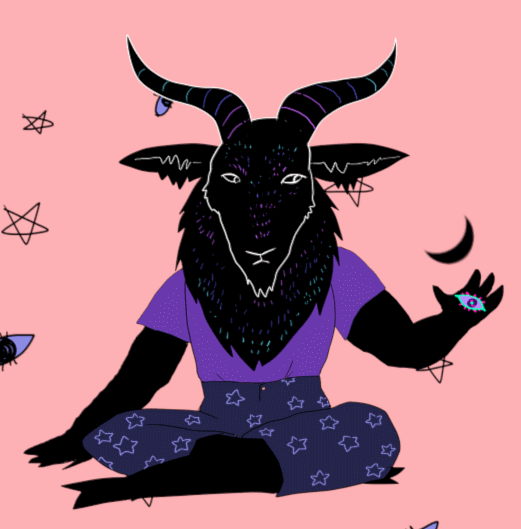
+: GIF Credit :+
⭒☆·━━━━━━━•( 🕸 )•━━━━━━━·☆⭒
༺・ What Does Satan Mean To Me? ・༻
My personal experience of Satan is that he's a very complex figure made up of many different bits and pieces from other spirits and deities. But mainly, I view Satan as being a triune godhead made up of three different beings/aspects; Lucifer, Sathanus, and Baphomet. It's kind of similar to the "Holy Trinity" in Christianity. He's a diagram I made of the "Satanic Trinity" lol.

In my UPG, I see Lucifer, Sathanus, and Baphomet as their own distinct entities, but I also see them as all being aspects of Satan as well. Think of them as being like a hydra dragon; Three distinct heads that all connect back to the same body. I also believe that other daemons can hold this title as well (Azazel, Belzebuth, Mephistopheles, and possibly many more) but I also see the term 'Satan' as just that; a title.
My best friend @sortiarus-de--naturas--daemonum has a really cool UPG regarding Satan as a title. She believes that Satan can be anyone or anything, and that it can also be a title for people who appose Christian (extremist) values. I actually really love this lol and agree with it quite a lot. ^.^
--- --- --- --- ---
In regards to the Satanic Trinity, the number (3) is said to historically be a sacred and magical number, revered across many different cultures and religions.
❧ In Celtic Paganism, the Earth was said to be made up of three realms/parts; Land, Sea, and Sky. ❧ In Alchemy, there were Three Primes (tria prima) that corresponded with the three aspects of human nature; Salt (body), Mercury (mind), and Sulfur (spirit). ❧ In Greco-Roman religion and Neo-Pagan religions such as Wicca, the triple goddess was a triune godhead usually made up of three different goddesses (e.g. Artemis-Selene-Hecate) and was usually also associated with the waxing, full, and waning phases of the Moon.
I view Satan in a very similar way to this. I see Sathanus and Lucifer as being almost like polar opposites, with Baphomet being in the middle of both of them.
❧ If Lucifer is Above and Sathanus is Below, then Baphomet is the middling Within and All Around. ❧ If Lucifer is the Sky (Upperworld) and Sathanus is the Land (Middleworld), then Baphomet is the Sea (Underworld) that meets and connects the two. ❧ If Lucifer is the Radiance of light and Sathanus is the Shadow of darkness, then Baphomet is the grey Quintessence in between. ❧ If Lucifer is the Sun above and Sathanus is the Earth below, then Baphomet is the Moon that middles between the two. ❧ If Lucifer is the Waxing Moon and Sathanus is the Waning Moon, then Baphomet is the Full Moon that connects the two moon phases together.
These are the correspondences I personally associate with Satan. I also have my own UPG about how Satan came to be.
⭒☆·━━━━━━━•( 🕸 )•━━━━━━━·☆⭒
༺・ So... Who Is Satan Then? ・༻
I believe that Satan came to be through many different deities, spirits, influences, and Christian extremist paranoia throughout history. To an extent, I believe Satan to be a spirit shard of sorts. What's a spirit shard, you ask? Allow me to explain...
+: Spirit Shards :+
❧ A spirit shard is when a piece of a deity or deities breaks off and develops into its own entity that stands alone from its fountainhead deity. This is usually the result of vilifying and demonisation of gods from other religions and belief systems, primarily done by Christian extremists.
A good example of this would be the formerly mentioned Bael and Astaroth; I believe they are both spirit shards of Baal and Ashtoreth that came about because of demonisation by Christian extremists, and eventually those demonisations broke off from the fountainhead deities and became distinct daemons.
I also believe that there was some egregoric influence that aided in the creation of Satan as well. Thus, I feel that he could partly be an egregoric entity too.
+: Egregoric Entities :+
❧ An egregoric entity is a spirit, deity, or other type of entity that arises into existence from the collective thoughts, influences, and energy input of a distinct group of people.
Lord/Lady Baphomet themselves are a perfect example of an egregoric deity that arose from the collective belief in them being falsely conflated with "The Devil" by Christians. But more on their origins a little later. :)
--- --- --- --- ---
With all of that said, here is my take on how the three main aspects of Satan that are Lucifer, Sathanus, and Baphomet came to be! Please note that this is just my UPG and isn't meant to be presented as an absolute truth or fact; These are just my personal beliefs.
Note: In my practice, I believe in eight elements rather than just five. I believe in Fire, Air, Water, and Earth. I also believe in Spirit, but I split it into three aspects; Spirit Above (Radiance), Spirit Below (Shadow), and Spirit Within (Quintessence). Finally, I also believe in Void as an eighth element, which is represented by The Self, as you are the ultimate creator of your own personal practice. :)
.
∙---+ 🜍.~ Lucifer ~.🜍 +---∙

As previously mentioned, Lucifer seems to have originated from the Roman god Phosphorus, a personification of the planet Venus that appears as the brightest "star" in the sky at dawn, called the "morning star". Phosphorus also had a brother named Hesperus, who was basically the same but instead appeared at dusk instead of dawn, and was known as the "evening star". In some accounts, the two gods were later combined into one singular deity.
For whatever reason, this niche Roman god was then dragged into the Christian Bible with the coming of Christianity, thus demonising them and leading to an initial split of Lucifer as a spirit shard from Phosphorus/Hesperus.
Interpretations then spread of Lucifer apparently being some sort of "fallen angel" that was cast out of Heaven for wanting to "rise above God" out of jealousy and pride. They were then conflated with being an evil demon, possibly originating from the benevolent daimon/daemon that was initially a type of guiding spirit that provided wisdom and knowledge, and not actually having anything to do with being evil at all.
Lucifer then started being conflated with The Devil, The Serpent, The Dragon, and the entire concept of Satan in general, thus leading to Lucifer earning their place in the Satanic Trinity.
❧ Lucifer represents higher consciousness, wisdom, enlightenment, knowledge, spiritual liberation and freedom, a guiding light in the dark, expressing/embracing your true self, confidence, standing up for yourself, self-love, rebellion, and always striving to be the best version of yourself.
+: Other Correspondences :+ - Animals: ravens/crows, hawks, swans, tree snakes, doves - Colours: icy blue, sunshine yellow, snowy white, sandstone orange, rich golds/silvers/bronze - Element: Air & Radiance (Spirit Above) - Incense/Scents: sandalwood, lavender, juniper, amber, lily - Metal: Copper & Gold - Planet: Venus & Sol (The Sun)
.
∙---+ 🜔.~ Sathanus ~.🜔 +---∙

In my UPG, Sathanus is a complex daemon and deity that came into being via multiple sources. I believe that the concept of him spawned in Judaism, Christianity, and Islam; However, he later broke off into a spirit shard and egregoric deity, and further developed into his own entity over time.
As Christianity spread and extremist paranoia began to mount throughout the years, more and more deities were demonised and vilified in comparison to the Christian God. Deities such as the Greek Pan, the Celtic Cernunnos, and the Canaanite Moloch were all conflated with "The Devil" and falsely assumed to be demons. Overtime, attributes and pieces of these gods and many other vilified horned deities began to feed into the concept of Satan; And in an egregoric fashion, Sathanus evolved into a daemon and deity of his own.
He even has entries in several demonology grimoires that were written within the past few hundred years (e.g. Livre Des Esperitz and Liber Officiorum Spirituum).
Sathanus is primarily The Serpent, The Devil, and The Dragon. In the Garden Of Eden, he showed Eve that she wasn't bound to follow the rules of God if she didn't want to. He gave her the fruit of the Tree Of Knowledge to open her eyes and show Eve that she had freewill and could be the god of her own life. At least, that's my interpretation of it anyway lol.
Some rumours suggest that The Devil appeared at Witches' Esbats as a "great black goat with a candle between its horns". In this account, he was referred to as "The Witches' Devil".
❧ Sathanus represents worldly pleasures, power through knowledge, self-leadership, ecstasy, strength, confidence, insurgence, finding/embracing the beauty in darkness, finding hidden wisdom, nature, deliverance from limitations, courage, hedonism, and liberation through "sin" and freewill.
+: Other Correspondences :+ - Animals: dragons, snakes, goats, bats, spiders - Colours: blood red, jet black, electric blue, rich golds, rosewood / dark strawberry pink - Element: Fire, Earth, & Shadow (Spirit Below) - Incense/Scents: dragon's blood, rose, cinnamon, black opium, sandalwood - Metal: Lead & Titanium - Planet: Saturn & Terra (The Earth)
.
∙---+ ☿.~ Baphomet ~.☿ +---∙

A lot of people don't actually believe in Baphomet as an existing daemon or deity, but rather simply as a symbol representing universal balance; However, from my personal experiences, they definitely are a very real entity. But how did they even come into being? Let's have a look at the history of Baphomet, and how they came to be associated with Satan later on.
Baphomet was said to have been a Pagan deity or idol that was allegedly worshipped by the Knights Templar. The name Baphomet first appeared in trial transcripts for the Inquisition of the Knights Templar starting in 1307. However, there doesn't seem to be any evidence that Baphomet was worshipped by the Knights Templar. Furthermore, it has been stated that the name Baphomet was actually a bastardisation of the name Muhammad, the founder of Islam.
It wasn't until the 19th century that the well-known illustration of the "Sabbatic Goat" was drawn by Éliphas Lévi. It was comprised of a number of binary elements in order to symbolise the "equilibrium of opposites"; Half-human and half-animal, male and female, good and evil, light and darkness, above and below, mercy and justice, etc. Lévi's goal was to symbolise his own idea and concept of balance, with Baphomet being an ultimate symbol and personification of "The Absolute".
But what many may not know about Baphomet, is that Éliphas actually drew inspiration from two distinct existing deities to create his Baphomet illustration; The Greek Pan and the Egyptian Banebdjedet. Lévi equates his image with a god that went by the title of "The Goat Of Mendes" (Mendes is the Greek name for the ancient Egyptian city of Djedet). On some accounts, it is said that Pan is The Goat Of Mendes, but it is much more likely that this title referred to Banebdjedet instead, who was mistaken to have been goat-headed instead of sheep-headed.
The chief deities of the city of Mendes were the ram deity Banebdjedet (meaning "Ba of the Lord of Djedet"), who was said to be the Ba of Osiris, as well as his consort Hatmehit, the fish goddess. In my UPG, Baphomet was partially conceived through these two deities, as well as through Éliphas Lévi's illustration.
❧ Baphomet represents ultimate balance, equity, unity of the universe and all its elements, cosmic order, the cycles of life/death/rebirth, queerness, beauty, duality, love and peace, creation, liberating knowledge, embracing/becoming your true and best self, creativity, wisdom, manifestation, and nature itself.
+: Other Correspondences :+ - Animals: sheep, goats, rams, cats, sea snakes - Colours: amethyst purple, sapphire blue, stormy grey, charcoal black, oceany blue-green - Element: Water & Quintessence (Spirit Within) - Incense/Scents: oud, patchouli, sandal rose (sandalwood and rose), frankincense, myrrh - Metal: Mercury & Silver - Planet: Mercury & Luna (The Moon)
.
+: Divider Border Credit :+
--- --- --- --- ---
Please keep in mind that all of the correspondences and associations listed here are brief summaries of my UPG regarding these three deities/daemons. I will be making additional posts going into further detail regarding Satan as a triune godhead, hopefully in the near future! I'm not sure when the posts will be out though lol.
⭒☆·━━━━━━━•( 🕸 )•━━━━━━━·☆⭒
Welp, that's pretty much it for this post! Holy shit this took me so long to write. 😭 I hope this has helped you learn more about Satan origins, and Satan as a concept as well as an entity!
I wish you well on your spiritual path. :)

༺⋆✦. Ave Satanas .✦⋆༻
-Korv
#daemonolatry info posts#demonolatry#demonology#paganism#pagan#demons#daemonolatry#daemonology#daemons#lucifer#sathanus#baphomet#satan#satanism#theistic satanism#spiritual satanism#luciferianism#theistic luciferianism#spiritual luciferianism#infernal gods#infernal divine#daemonic gods#daemonic divine
92 notes
·
View notes
Text
27 Menachem Av 5784 (30-31 August 2024)
Shabbat shalom! Sabado bueno! Gutt shabbos! It is once again Judaism’s holiest and most significant holiday. We welcome shabbat with candles and song and then end our time in this holy temporal sanctuary with a feast for the senses at havdalah: the taste of wine, smell of spices, sight and feel of the multiwicked candle’s flame, and sound of the blessings. May the day of rest help steady you. This particular shabbat is a Shabbat Mevarchim, which is the Shabbat on which we offer a blessing upon the coming month. This blessing is recited in many communities following the Shabbat mourning Torah reading and is as follows:
May the One who performed miracles for our ancestors and delivered them from slavery to freedom, speedily redeem us and gather our dispersed people from the four corners of the earth, uniting all of Israel, and let us say, Amen. (Amen). Rosh Chodesh Elul will be on the third and fourth day of week, which come to us for good. May the Holy One, blessed be HaShem, renew it [the month] for us and for all G-d’s people, the house of Israel, for life and peace (Amen), for gladness and for joy (Amen), for deliverance and for consolation, and let us say, Amen. (Amen)
The practice of blessing the coming month helps situate us in time and in the cycle of the seasons created by the turning of the earth and the interlocking orbital dance of sun, earth, and moon. It offers us an opportunity to look forward to and prepare our kavanah for the upcoming lunar cycle and its special observances and commemorations. And blessing gives us an opportunity for profound gratitude for the moment we find ourselves present in now and lets us collectively express our wish for future healing and joy. May the coming month of Elul be to you for good!
The parashat hashavua is Re’eh in Devarim, which offers an overview of some of the most foundational mitzvot of the Torah in preparation for the ritual of blessings and curses on Mount Gerizim and Mount Ebal. The prohibition on idolatry, the principles of kashrus, the cycle of the shmita and yovel years, and the core pilgrimage festivals are all reviewed for the whole community. Moshe offers special attention to the duty of tzedekah — for those with surplus to share with those who don’t have enough. Moshe emphasizes that the halakhically enumerated tithes and debt cancellation aren’t enough:
For there will never cease to be those in need in your land, which is why I command you: open your hand to the poor and needy kindred in your land.
The haftarah is another passage of comfort to the exiled Israelites from Yeshayahu haNavi, assuring them of HaShem’s love and abundant generosity. Like the Torah portion, it emphasizes that G-d provides for all of our needs without expecting payment. The least we can do is take care of each other.
Just a few days remain in the month of Av. Then we will enter Elul, the preparatory month for the high holy days, during which it is said that our divine sovereign comes down from the heavenly throne and joins us in the field of our daily lives. With HaShem coming close to us it is easier in this season for us to draw close to HaShem, if we wish to do so. Elul is a time to consider what we’ve learned in the past year— what we’ve done right and where we’ve gone wrong— and to seek guidance as we move forward into a new Hebrew year and offer our accounting on Rosh HaShana and Yom Kippur.
#jewish holidays#jewish calendar#hebrew calendar#judaism#jewish#jumblr#Shabbat#gutt shabbes#shabbat shalom#sabado bueno#shabbat kodesh#shabbat mevarchim#Torah#Devarim#parashat re’eh#sefer yeshayahu#Menachem Av#27 Menachem Av#🌘
9 notes
·
View notes
Text
Sm South Park Headcanons for the characters that hold my brain hostage. (Also this is them as older teens/adults)
Kyle
-Biromantic/Asexual who just lives happily in comphet for years. He just kinda appreciates and sees the value in everyone but obviously guys just date girls. They just appreciate other men equally you know?
-King has OCD up to his god damn teeth but refuses to see a therapist because there's nothing wrong with him he's just being "proactively cautious".
-Sick kid to neurotic adult pipeline
-Very much takes comfort in the rituals and structure of Judaism
-Often ends up defaulting to mom friend despite how much his friends make fun of him for it
-He's kind of a normie. Like yeah he reads philosophy and psychology but if you try to talk to him about anything remotely indie or punk he kind of just stares at you blankly
-Basketball Guy
-Also hes the one who has a car and is exploited for it
-Does not like Stan hanging out with the Goth kids
Stan
-Closet homosexual trying so hard to be straight
-Bipolar and easily falls into deep depressive lows that he self medicates for
-Randy put him in therapy just so he could rant at the therapist about how toxic Stan is
-He believes deeply he's just a fuck up and has kind of given up on trying. Why play the rat race if your destined to lose? Might as well just party
-Gets tired of Kyle nagging him constantly
-Hangs out with the Goth Kids more and I think he and Michael become close
-He gets crushes easily but the big ones are Kyle and Michael. But Kyle's straight so that's just another reason to self destruct
-He wants to like Wendy so fucking bad. He wants to be good. He wants to be her boyfriend. He just..doesn't know how to pretend good enough to make it real
-inevitably they break up for real in highschool and it sends him into one of the deepest lows of his life
-After this he gets insanely drunk and kisses Kyle but Kyle just assumes he's out of it and never brings it up again because he doesn't want to embarrass Stan. This drives Stan mental
-His parents seriously discuss military school and Stan is considering just joining out of highschool anyways
-He's just a body why not put it to work
Eric
-HOMOHOMOHOMOHOMO ANY PRONOUNS GENDER FLUID HOMO
-So very insanely closeted out of fear of being rejected
-Kenny knows
-On anti psychotics that he regularly forgets to take
-Writes explicit fanfiction about him and his friends and posts them on A03 under different names
-Has a Twitch stream drag hustle like Finnster (initially he was using butters for this but then she came out at Margarine and said she didn't want to be a online whore because she was a respectable lady and Eric took up the mantle himself)
-Clyde is one of his regular watchers and donators but has 0 idea it's Eric
-Eric eventually blocks him because Clyde keeps sending him dick pics
-Kylekylekylekylekylekylekylekyle
-He wants his attention so bad it's insane
-His best friend is his mom
-They have weekly spa nights and watch romcoms and dating reality tv together
-He taught her a skin routine
-He has sent in online auditions for Kidzbop multiple times
-Kenny was his first kiss and first time
Kenny
-Any Pronouns genderfluid bi king
-Mostly gets He/Him'd by his friends but brushes it off
-Has done his rounds in the school but no relationship has ever lasted long
-He has a tendency to let himself be used as he sees his service and time as the only thing he can offer other people (this extends to his friends as well)
-Sweet goofy persona that quickly turns dark if someone really fucks up (this happens rarely but they're terrifying)
-She works as a mechanic apprentice outside of school and has a cobbled together motor bike she built herself
-Flirts with everyone and craves touch and affection
-Kind of one of the only people who genuinely likes Eric and sees past his bullshit
-The friend who knows how to get things
-Was Elated when Margarine came out and wants to be her boygirl wife so bad
-Microdoses some back alley E as a treat
-Only ever really hangs out with Stan when Stan wants to party
-Despite being friends with everyone Kenny often feels incredibly isolated and lonely
-Everyone calls him when they need something but who does she call when she needs something.
Michael (Goth Kid)
-he/it, stealth trans, just IDs as Queer
-Jewish but insanely quiet about it
-Used being goth initially as a way to distract kids from making fun of him for his heritage. Now he's in deep
-Very vocally loathes Eric Cartman and will beat him
-Cane is passed off for aesthetics but is a needed mobility aid for joint issues
-The older goth kids are an acting Polycule but will date outside of each other
-He starts to get close to Stan and enjoys how real he feels.
-Has a contentious relationship with Kyle and how he kind of morally lord's himself over Stan and others
-Doesnt have much of a relationship with his parents. His mom and dad are separated and although he lives with his dad his father regularly travels for business so he often gets the house alone to himself.
-Secretly takes a lot of comfort from his dad's old records
-He also has a secret hiding place in some abandoned sewer pipping where he goes to get away from everyone including his friends. Stan is the only one who knows about it
-On a first name basis with a lot of the unhoused people in South Park and will hang out with them as well
-He has a black kippah for holidays or temple (though his father rarely goes to temple anymore
(I will write more for others later this has already taken me an hour
#south park#kyle broflovski#kenny mccormick#stan marsh#eric cartman#south park hcs#south park goth kids
71 notes
·
View notes
Text
Something very frustrating about the whole i/p is how people view this place
The MENA is the only place in the WORLD where ppl try to rewrite its history and force indigenous-ity over its colonizers just bc the colonizers aren't "white European". instead of accepting the place was colonized and moving on and try to learn the native cultures and stuff
The brits know they colonized america and a big part of the world
The germans know they caused the holocaust
The mongols know about chinggis khan horrible rein and the massacre of millions
The american know they are not natives to america
We all know about the greek, roman and ottoman empire were conquering and colonizing land
So why can't arabs accept that they are also colonizers? Its ok, every nationality did horrible shit throughout history but instead of accepting it they just force themselves into nativity- ofc with time they mingled with the natives and most of them are mixed- but it doesn't cancel anything. Now the west and practically the whole world CHOSES to ignore history. As if the fact that you are not light skinned/white/european means that you can NEVER oppress or do something horrible.
Altho arabic is fund by different native languages it still originated in arabia peninsula(saudi arabia) just like islam and the arab identity. But bc it happened almost 1500 years ago and sound so far in the past people just choose to ignore it and in the end, with the israel-palestine conflict it hurts jews and our history bc no arabic is not indigenous. Its not nablus, its sh'hem and was called that name even BEFORE abraham was even born. Even islam isn't indigenous the canaan- Christianity and judaism are.
Im not shaming or anything but self awareness is important.
Bc we all from the same area then ofc there will be A LOT of similarity with the clothes, food, music etc just like there are a lot of similarities between Japanese and chinese culture altho they all are different its just NORMAL. The problem is that bc jews were colonized so much, everyone destroyed everything we have, bc of the diaspora jews gathered the cultures they grew up in from different countries and brought it with them to israel that's why "israeli culture" is made of a lot of different cultures worldwide, not bc "they stole it"
Israel is the ONLY place in the world that got successfully decolonised and rebuild and the world has never been angrier about that. Just mind blowing
#israel#jews#Palestine#arabic#ישראל#MENA#middle east#History#Culture#Colonization#Decolonization#Roman empire#America#ישראבלר#Hebrew#Native#jews are indigenous#Arabs aren't indigenous to israel#Just accept it#Its not the end of the world#sheesh#antisemism#antizionism is antisemitism#Islam#Judaism#am israel hai#jumbler#from the river to the sea yall can suck my d#gaza#jewish
26 notes
·
View notes